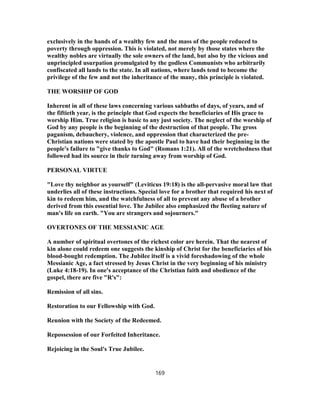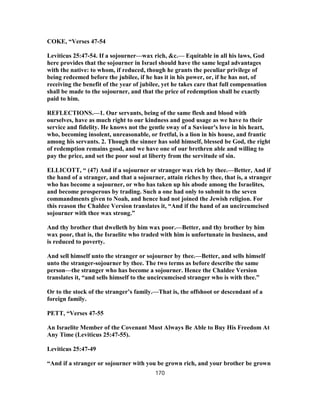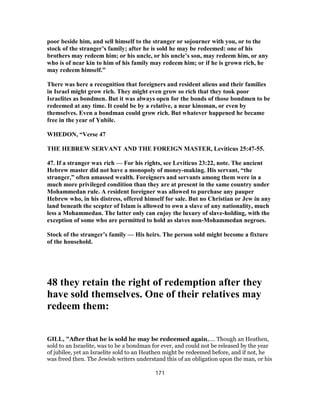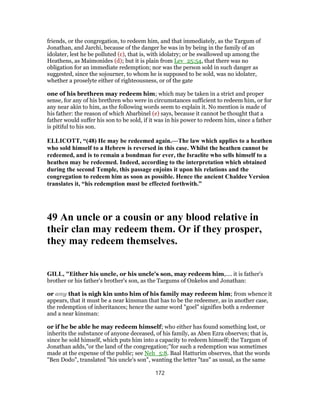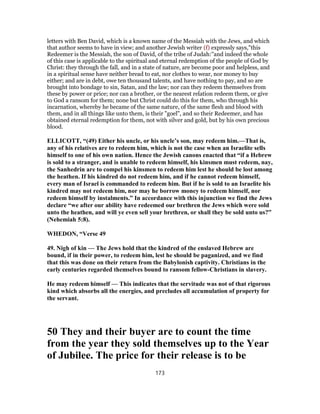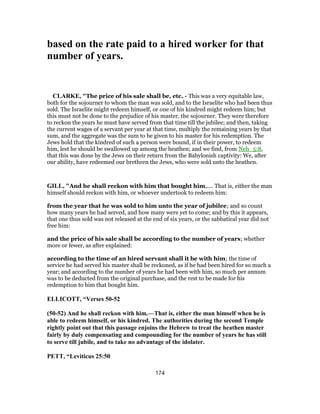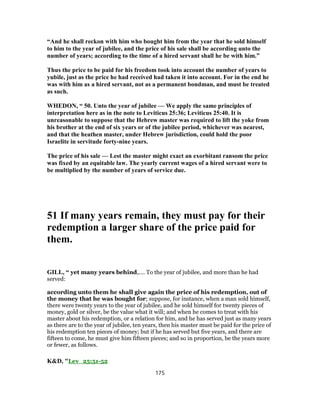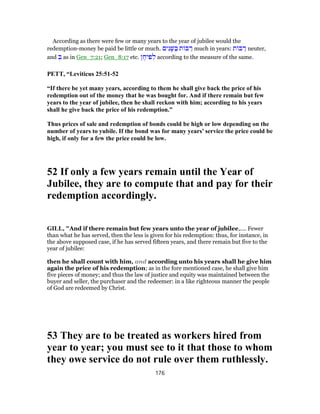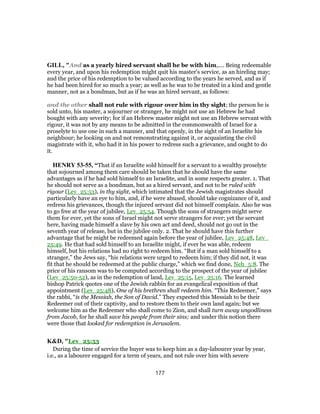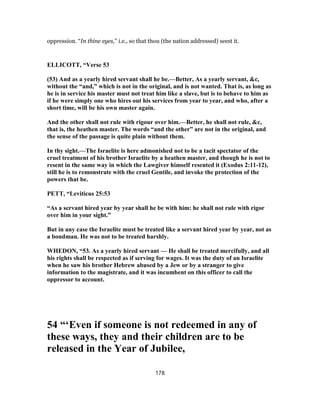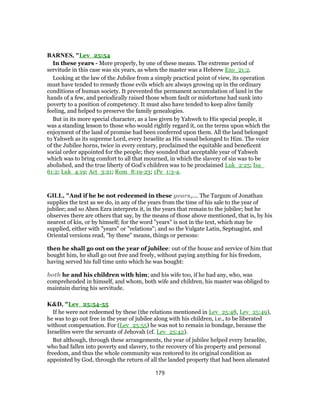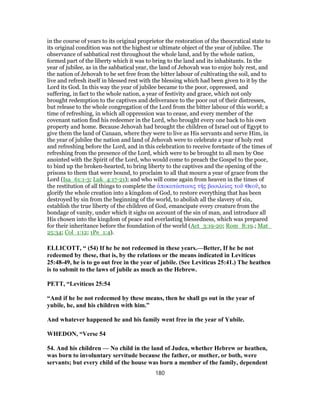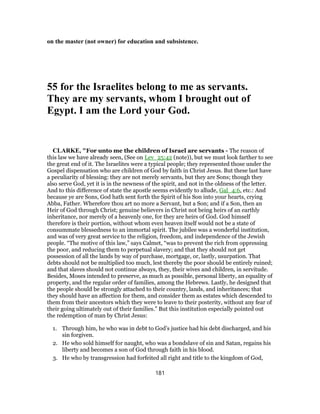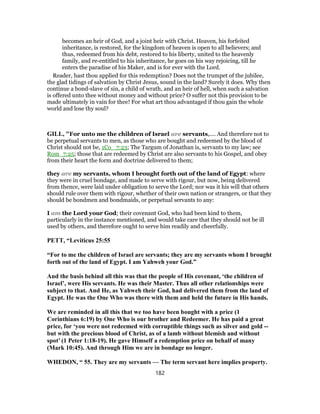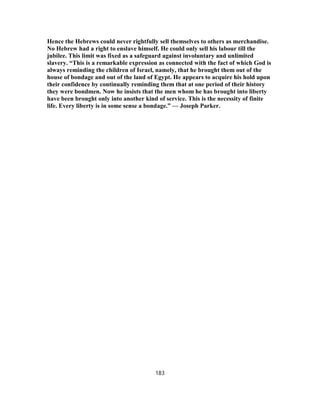Leviticus 25 provides instructions for the Sabbatical year and the Jubilee, emphasizing rest for the land and provisions for the poor. The Sabbatical year, observed every seventh year, mandates that no farming occurs and the harvest that grows naturally is shared with those in need, reinforcing God's ownership of the land and care for social justice. The Jubilee, occurring every fiftieth year, serves to restore property and freedom, embodying deeper spiritual significance and prefiguring Christ's message of liberation.
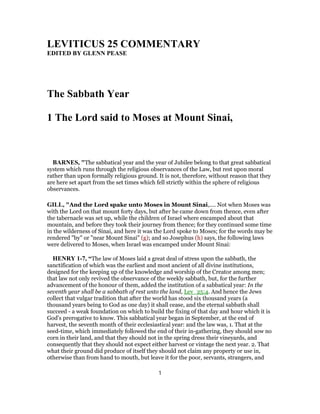
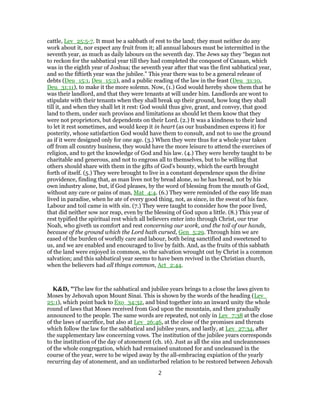
![and His people; so, by the appointment of the year of jubilee, the disturbance and
confusion of the divinely appointed relations, which had been introduced in the course
of time through the inconstancy of all human or earthly things, were to be removed by
the appointment of the year of jubilee, and the kingdom of Israel to be brought back to
its original condition. The next chapter (ch. 26) bears the same relation to the giving of
the law upon Sinai as Exo_23:20-33 to the covenant rights in Ex 20:22-23:19.
COFFMAN, “This chapter deals exclusively with the Jubilee, the super-sabbatical
year which followed the seventh sabbatical year, the same being every fiftieth year
of the Jewish calendar. Its being legislated in Leviticus ties it emphatically to the
ordinary sabbath and to the sabbatical years, meaning that there could not have
been, in any strict sense, the keeping of the sabbath day unless these extensions of it
in sabbatical years and the ultimate Jubilee were also observed. It is imperative to
understand the unity of all the sabbath laws, and it is the failure of present-day
sabbatarianism to receive this that utterly discredits and nullifies it. Some people in
our times indeed pretend to observe the sabbath day, but they do not keep the
sabbath until these Divine extensions of it are also honored. The old Israel was
condemned for not observing the sabbath years, and God sent the whole nation into
captivity for a period of 70 years to make up for the period of 490 years in which
they had failed to observe them (2 Chronicles 36:20-21). Thus, keeping the sabbath
days meant nothing unless the sabbath years were also observed.
The very name "Jubilee" is of great interest. It has come to be the name of all great
celebrations such as Golden Weddings, etc.; and Queen Victoria celebrated her
Jubilee on the 50th anniversary of her coming to the throne of the British Empire
(1837-1887). Spelled as "Jubile" in the KJV, the word derives from the Hebrew
word for "trumpet,"[1] for it was the blowing of the trumpet on the Day of
Atonement that signaled the beginning of the Jubilee. In fact, Tyndale translated the
word for Jubilee as "a yere of hornes blowinge," "the trompett yere," and "the
horne yere" (Leviticus 25:10,15,28).[2] The word "Jubilee" is an onomatopoetic
word, that is, "imitation of a joyful shout, or cry of joy, later accommodated to
mean the sound of the trumpet ushering in the season of joy."[3] The word for
Jubilee is a very ancient word, and along with certain instructions attending the
divine regulations concerning it (as in Leviticus 25:30) suggests a time-frame during
the second millennium B.C.[4] It is therefore foolish to suppose that, "The Jubilee
arose after the downfall of the Judean kingdom."[5] As a matter of fact, the Jewish
Scriptures affirm that it was the failure of Israel to observe the sabbatical years for
a period of 490 years (seventy of them being not observed) that God sent them into
captivity (2 Chronicles 36:20,21) until the land should have its 70 sabbaticals as God
had commanded, hence, the duration of the captivity.
The answer of whether or not the Jews ever faithfully observed their Jubilees
appears to be that they did not. There is no Biblical reference to their ever having
done so, and, in fact, the Jubilee is not mentioned at all except in this chapter, six
times in Leviticus 27, and once in Numbers 36:4, where it is mentioned as an event
3](https://image.slidesharecdn.com/leviticus25commentary-161222180012/85/Leviticus-25-commentary-3-320.jpg)
![in the future. Their failure to observe it might have resulted from the difficulty they
might have had in determining the date from which they were to begin counting.
This would have been true because the better part of a generation was to elapse
before they as a whole people actually entered Canaan, and some parts of it were
occupied before other parts, and some tribes received their inheritance at different
times from others. That very great and important spiritual significance lay in these
instructions for the Jubilee is certain, because, when Jesus Christ began his ministry
(Luke 4), there appears to be a direct reference to the Jubilee in his words: "He
anointed me to preach good tidings to the poor ... to proclaim release to the
captives ... to set at liberty them that are bruised ... to proclaim the acceptable year
of the Lord" (Luke 4:18-19). Such a declaration is all but a dogmatic affirmation of
the Christian dispensation as earth's Jubilee. Of course, it would be the slaves to sin
who would be released, and the captives held in the service of Satan who would
receive their liberty through Christ.
For other interesting observations regarding the Jubilee, see several paragraphs at
the end of this chapter.
Wenham's outline divides the chapter into three divisions:
I. The Jubilee - a sabbath for the land (Leviticus 25:1-22).
II. The Jubilee - and the redemption of property (Leviticus 25:23-38).
III. The Jubilee - and the redemption of slaves (Leviticus 25:39-55).
"And Jehovah spake unto Moses in mount Sinai, saying, Speak unto the children of
Israel, and say unto them, When ye come into the land which I give you, then shall
the land keep a sabbath unto Jehovah. Six years thou shalt sow thy field, and six
years thou shalt prune thy vineyard, and gather in the fruits thereof; but in the
seventh year shall be a sabbath of solemn rest for the land, a sabbath unto Jehovah:
thou shalt neither sow thy field, nor prune thy vineyard. That which groweth of
itself of thy harvest thou shalt not reap, and the grapes of thy undressed vine thou
shalt not gather: it shall be a year of solemn rest for the land. And the sabbath of the
land shall be for food for you; for thee, and for thy servant and for thy maid, and
for thy hired servant and for thy stranger, who sojourn with thee. And for thy
cattle, and for the beasts that are in thy land, shall all the increase thereof be for
food."
"Jehovah spake unto Moses in mount Sinai ..." "This shows that all related here
was delivered to Moses in the first month of the second year after their coming out
of Egypt (Numbers 10:11-12).[6] Keil pointed out that the effect of this statement is
that of "binding together in an inward unity the whole round of laws that Moses
received from God upon the mountain, and announced gradually unto the
people."[7] The same words are repeated three other times in Leviticus (Leviticus
7:38; 26:46; and Leviticus 27:34).
4](https://image.slidesharecdn.com/leviticus25commentary-161222180012/85/Leviticus-25-commentary-4-320.jpg)
!["The seventh year shall be a sabbath of solemn rest ..." Despite there having been a
certain benefit that accrued to the soil through its lying idle on the seventh year, one
cannot believe that it was merely the land's benefit that God had in mind back of
the regulations in this chapter. This was an antidote for human greed and an
affirmation of God's ownership of the land, and of his concern for the poor and even
for the wildlife.
"That which groweth of itself ..." ("Of its own accord ..." KJV) (Leviticus 25:5).
This is of interest, because "It is the only example of its in KJV being used as a
neuter possessive, which in the KJV was almost always expressed by "his" as the
possessive neuter pronoun. In the KJV of 1611, it is printed it; `that which groweth
of it owne accorde'."[8]
"The sabbath of the land shall be for food ..." (Leviticus 25:6). This means that
what grew of its own accord could be used for food, but that no reaping of the
voluntary yield was allowed. Note also that a garden was not prohibited. It was the
fields and vineyards upon which the prohibition lay. "Exodus 23:10f mentions only
the poor and the wild beasts as beneficiaries of this institution";[9] but here the
`owner' or tenant is also included.
COKE, “Verse 1
Leviticus 25:1. The Lord spake—in mount Sinai— The particle rendered in, might,
with as much propriety, be rendered at, or near. The word sabbath, Leviticus 25:2.
&c. would have been better translated throughout this chapter by the word rest, as
in the margin of our English Bibles. The first mention of this extraordinary
institution is made, Exodus 23:11 where the reason of it is, in part, assigned. It was
to take place every seventh year, after their settlement in Canaan. The first
sabbatical year was celebrated by the children of Israel, as it is thought, on the
seventh year after their coming into the land of Canaan: this year was reckoned not
from Abib, or March, but from Tisri, or September; but of this see more on
Leviticus 25:8.
ELLICOTT, “(1) And the Lord spake unto Moses.—This chapter should properly
have followed Leviticus 23, since the institutions of the sabbatical year, and the
jubile which it discusses, are closely connected with the regulations about the
festivals laid down in that chapter. The isolation of these ordinances from the rest of
the festivals cannot be satisfactorily explained on any other principle than that
which the authorities during the second Temple laid down, viz., that many of the
sections are transposed, and that “there is no strict sequence in the Law.”
In Mount Sinai.—That is, in the mountainous regions of Sinai. The expression
“mountain” is often used to denote a mountainous tract of country (Numbers 12:9;
Deuteronomy 1:2; Joshua 14:12, &c.). Accordingly, this divine communication was
made to Moses when the Israelites were encamped in the neighbourhood of Sinai,
5](https://image.slidesharecdn.com/leviticus25commentary-161222180012/85/Leviticus-25-commentary-5-320.jpg)
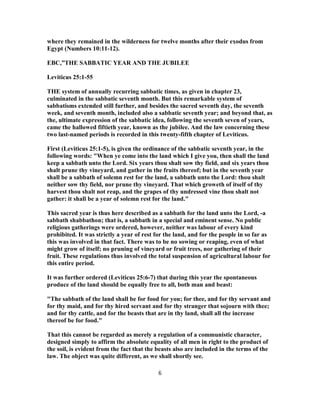
![That it should be regarded as possible for a whole people thus to live off the
spontaneous produce of self-sowed grain may seem incredible to us who dwell in less
propitious lands; and yet travellers tell us that in the Palestine of today, with its rich
soil and kindly climate, the various food grains continuously propagate themselves
without cultivation; and that in Albania, also, two and three successive harvests are
sometimes reaped as the result of one sowing. So, even apart from the special
blessing from the Lord promised to them if they would obey this command, the
supply of at least the necessities of life was possible from the spontaneous product of
the sabbath of the land. Though less than usual, it might easily be sufficient.
Deuteronomy 15:1-11, it is ordered also that the seventh year should be "a year of
release" to the debtor; not indeed as regards all debts, but loans only; nor,
apparently, that even these should be released absolutely, but that throughout the
seventh year the claim of the creditor was to be in abeyance. The regulation may
naturally be regarded as consequent upon this fundamental law regarding the
sabbath of the land. The income of the year being much less than usual, the debtor,
presumably, might often find it difficult to pay; whence this restriction on collection
of debt during this period.
The central thought of this ordinance then is this, that man’s right in the soil and its
product, originally granted from God, during this sabbatic year reverted to the
Giver; who, again, by ordering that all exclusive rights of individuals in the produce
of their estates should be suspended for this year, placed, for so long, the rich and
the poor on an absolute equality as regards means of sustenance.
TRAPP, “Leviticus 25:1 And the LORD spake unto Moses in mount Sinai, saying,
Ver. 1. And the Lord spake unto Moses in Mount Sinai.] Posthuman, returning
from the eastern parts, is, by Sulpitius, (a) brought in thus speaking: I saw the Red
Sea, I went up Mount Sinai, the very top whereof, reaching up almost to heaven,
cannot be come at.
Leviticus 25:2 Speak unto the children of Israel, and say unto them, When ye come
into the land which I give you, then shall the land keep a sabbath unto the LORD.
2 “Speak to the Israelites and say to them: ‘When
you enter the land I am going to give you, the land
itself must observe a sabbath to the Lord.
7](https://image.slidesharecdn.com/leviticus25commentary-161222180012/85/Leviticus-25-commentary-7-320.jpg)
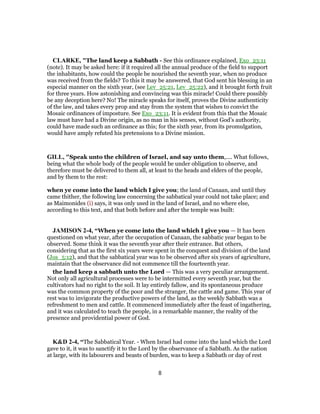
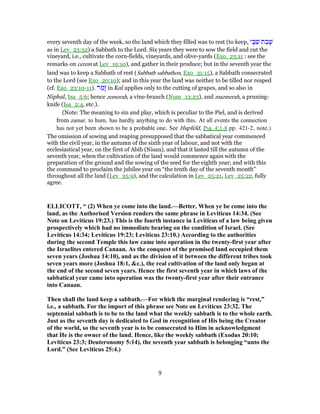
![TRAPP, “Ver. 2. Then shall the land keep a Sabbath.] By their weekly Sabbath they
professed that themselves belonged to God, though Seneca jeers them for it, as those
that cast away the seventh part of their time. By this seventh year Sabbath, they
professed that their land belonged to God, and that they were only his hinds, his
tenants, and tithemen. Hence it is called the Lord’s land, [Hosea 9:3] and
Immanuel’s. [Isaiah 8:8]
PETT, “Leviticus 25:2
“Speak to the children of Israel, and say to them, When you come into the land
which I give you, then shall the land keep a sabbath to Yahweh.”
He was to inform the children of Israel that not only must they keep Sabbath every
seventh day, but the land must keep sabbath as well every seventh year. Once they
had entered the land and it had been distributed to them as their gift from Him,
they were to observe a sabbath rest for the land after every period of six years, a
period again in which they did no labour.
WHEDON, “ THE SABBATICAL YEAR, Leviticus 25:1-7.
2. The land keep a sabbath — Literally, rest a sabbath. The soil was to lie untilled.
Hence this law was not applicable to Israel’s wilderness life, where there was no
tillage. We are not to be restricted to the literalism of the text, and to insist that the
first year in Canaan must be sabbatical. The land was not properly given till it was
conquered. Hence the best Jewish authorities teach that this law became obligatory
fourteen years after the first entrance into the Promised Land, seven years being
consumed in the conquest, and seven more in the allotment.
BI 2-55, “A Sabbath of rest unto the land.
The sabbatic year and jubilee
1. I do not suppose that these sabbatic regulations referred severally to separate and
distinct things. The seventh day, the seventh month, the seventh year, and the year of
jubilee, as I take them, all express the same great thought, and are related to each
other in signification as the different sections of a telescope. They fold into each
other. The one is only a repetition of the other on a larger scale. And they all range in
the same line to give a focus for gazing the further into the depths and minuter
details of one and the same scene. We have sabbaths of days, and sabbaths of
months, and sabbaths of years, and septenaries of years, all multiplied in each other
with augmenting interest, to indicate the approach of some one great seventh of time
when all God’s gracious dealings with man shall come to their culmination, and to
point the eye of hope to some one grand ultimate sabbath, in which the weary world
shall repose from its long turmoil and all its inhabitants keep jubilee.
2. The word “Jubilee” is of doubtful origin and signification. Some derive it from a
verb which means to recall, restore, bring back; which would very appropriately
designate an arrangement which recalled the absent, restored the captive, and
brought back alienated estates. Some trace it to Jubal, the inventor of musical
10](https://image.slidesharecdn.com/leviticus25commentary-161222180012/85/Leviticus-25-commentary-10-320.jpg)
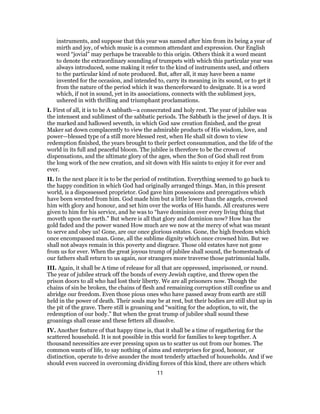
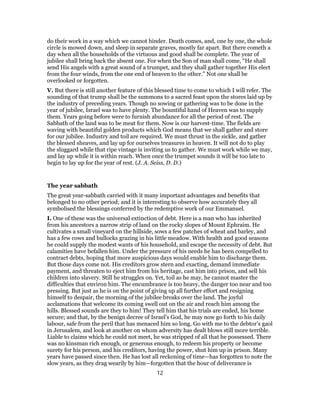
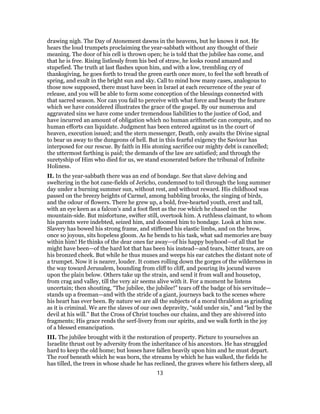
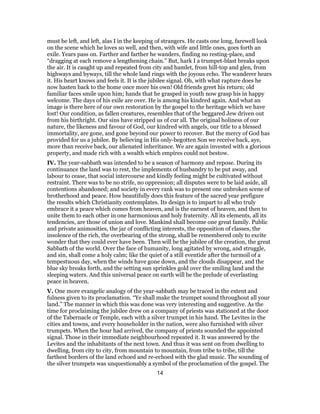
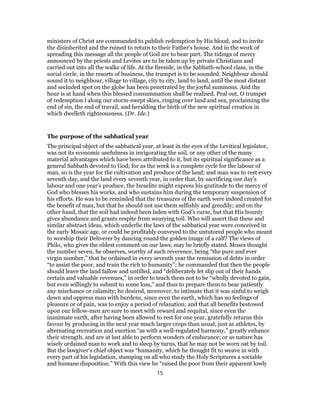
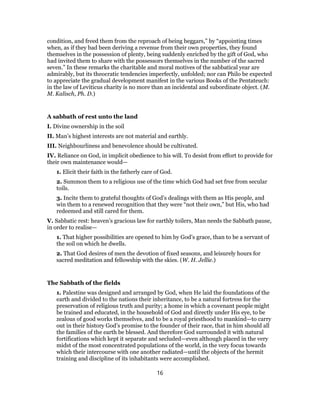
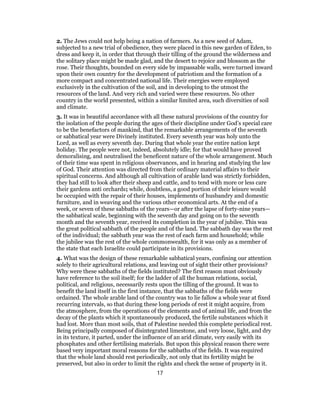
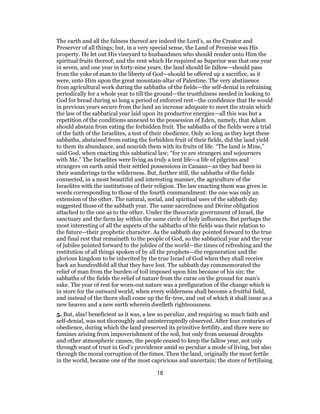
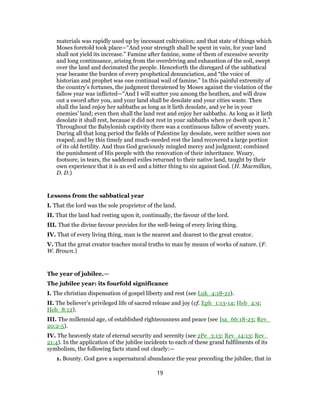
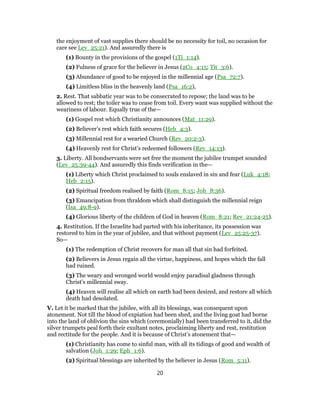
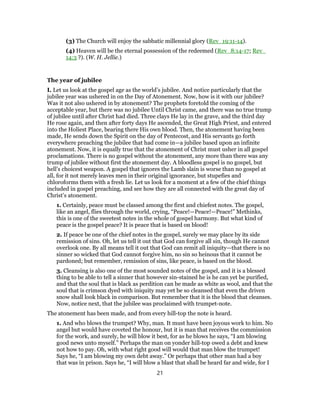
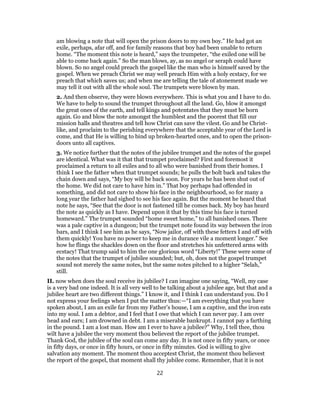
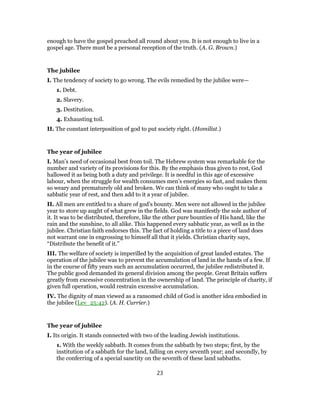
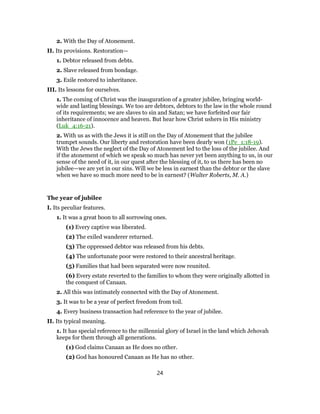
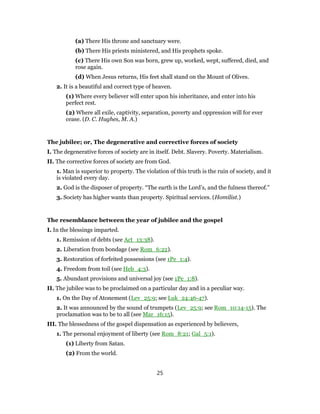
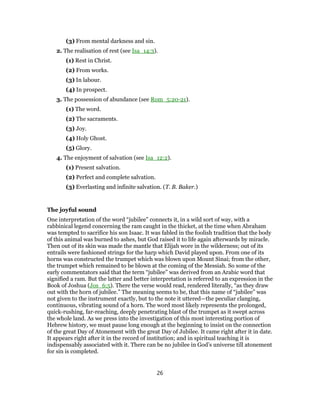
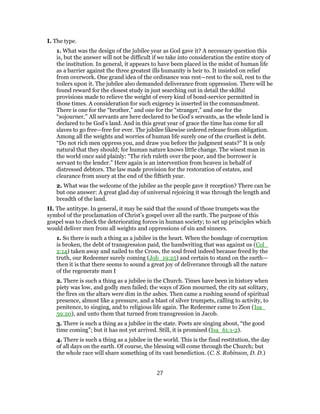
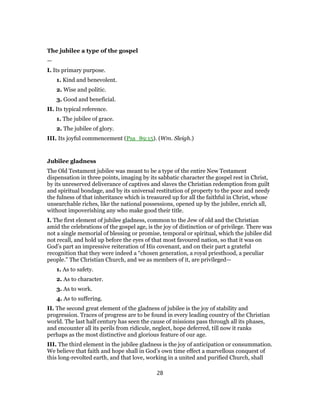
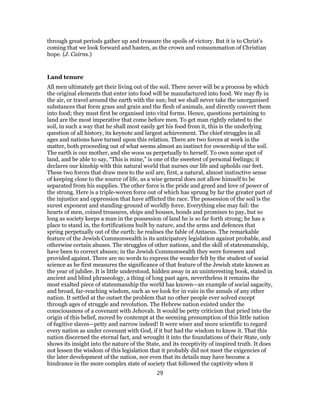
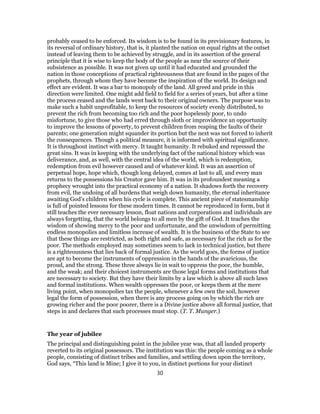
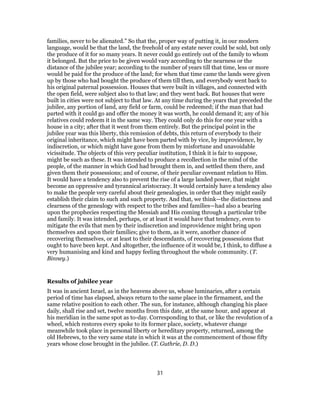
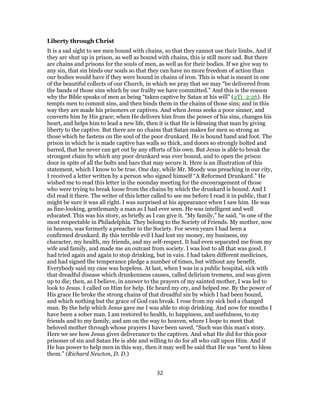
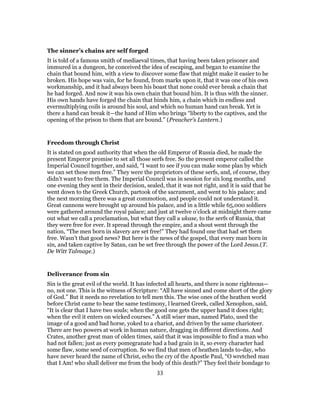
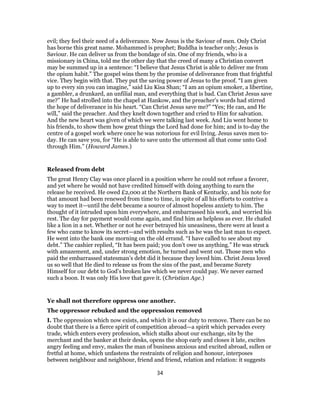
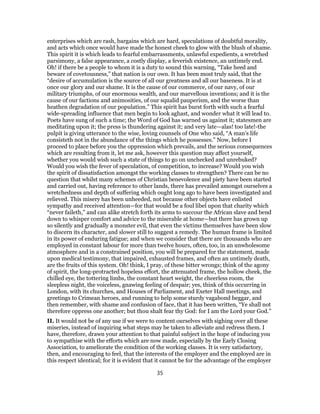
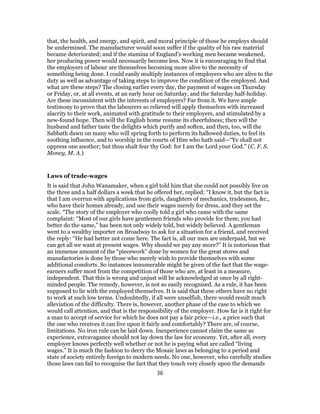
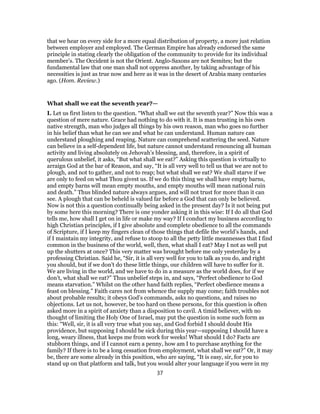
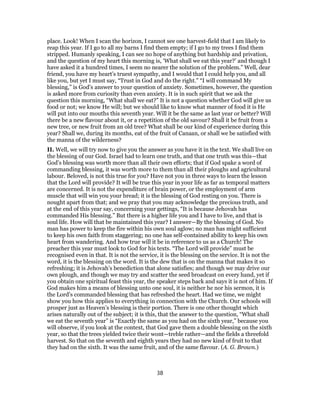
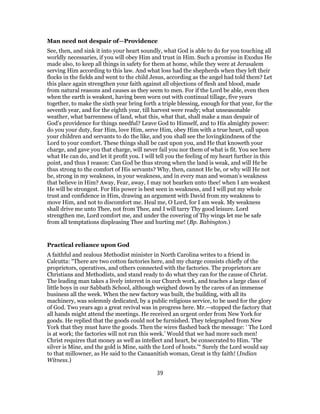
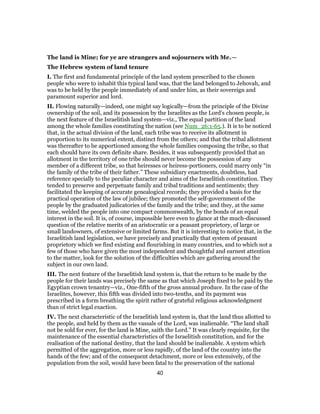
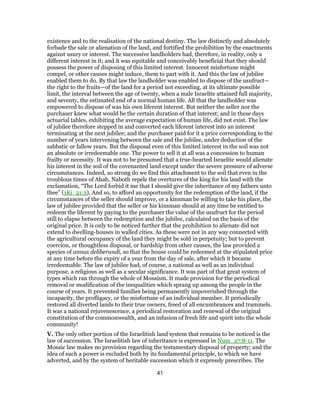
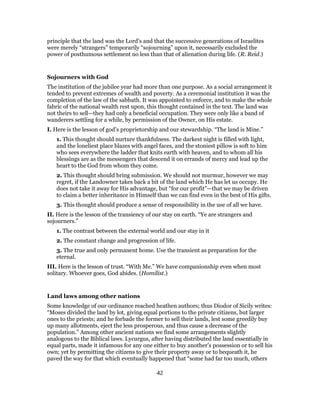
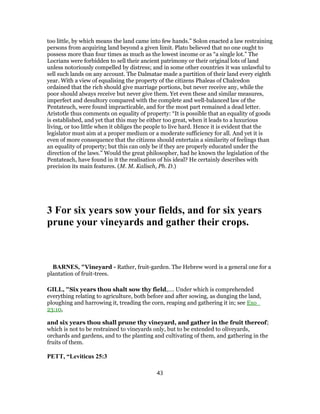
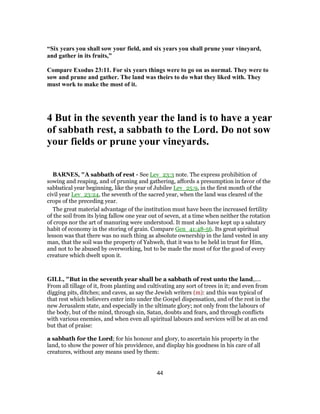
![thou shalt neither sow thy field nor prune thy vineyard; under which are
comprehended all acts of agriculture, which respect the cultivation of vines, olives, figs,
and, according to the Misnah (n), there were some instruments which it was not lawful
to sell to an artificer in the seventh year, such as a plough, with all belonging to it, a yoke,
a fan, a spade, but he may sell him a scythe, or a sickle, or a cart, and all its instruments;
and which the commentators (o) interpret of one that is suspected of working in that
year; the house of Shammai say, an heifer that ploughed might not be sold that year.
COKE, “Leviticus 25:4. A sabbath for the Lord— As the weekly sabbath was a
testimony of their belief in and homage to God the Creator, so the yearly sabbath
was a public testimony that their land was consecrated to the same God; that he had
settled them in it as his true worshippers, and that they held it as tenants under him,
their great lord and proprietor. We do not mention the wise and merciful ends of
this institution, as they come with more propriety under what we have to say
concerning the jubilee.
ELLICOTT, “ (4) The seventh year shall be a sabbath of rest.—Literally, the
seventh year shall be a rest of solemn resting, or a sabbath of sabbaths. For the
import of this phrase see Note on Leviticus 16:31. Like the weekly sabbath, the
seventh year is to be the Lord’s sabbath. The soil is therefore to have a perfect rest.
Thou shalt neither sow thy field.—What constitutes cultivation, and how much of
labour was regarded as transgressing this law, may be seen from the following
canons which obtained during the second Temple. No one was allowed to plant trees
in the sabbatical year, nor to cut off dried-up branches, to break off withered leaves,
to smoke under the plants in order to kill the insects, nor to besmear the unripe fruit
with any kind of soil in order to protect them, &c. Any one who committed one of
these things received the prescribed number of stripes. As much land, however,
might be cultivated as was required for the payment of taxes as well as for growing
the barley required for the omer or wave sheaf at the Passover, and wheat for the
two wave-loaves at Pentecost.
TRAPP, “Leviticus 25:4 But in the seventh year shall be a sabbath of rest unto the
land, a sabbath for the LORD: thou shalt neither sow thy field, nor prune thy
vineyard.
Ver. 4. A Sabbath of rest unto the land.] This and the jubilee year shadowed our
eternal rest. [Colossians 2:16-17 Hebrews 4:9] (l.) Every seventh day they rested
from their labours. (2.) Every seventh year the ground rested. (3.) Every seventh
seventh (as some reckon it) was the jubilean Sabbath: at which time all debts were
remitted, prisoners released, mortgages restored to the right inheritors. The great
and eternal Sabbath comprehends all these. How then should we breathe after it,
and even go forth to meet it, as the Jews do their weekly Sabbath, beginning it an
hour sooner than the law required? and this they called their Sabbatulum, or little
Sabbath.
45](https://image.slidesharecdn.com/leviticus25commentary-161222180012/85/Leviticus-25-commentary-45-320.jpg)
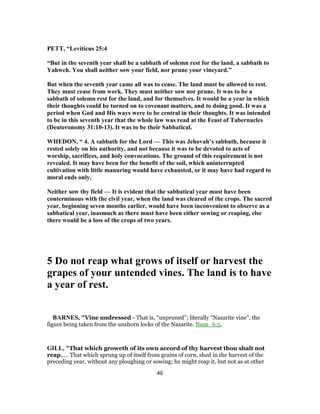
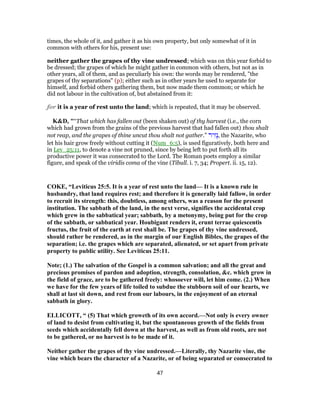
![God. As the seventh year is the sabbath of the Lord, being consecrated to Him, the
vine of this year is consecrated to Him. Hence the Greek version (LXX.) translates it
“the grapes of thy consecration,” and hence, too, the marginal rendering “of thy
separations.” The passage is also interpreted “thou shalt not gather the grapes from
which thou hast separated and debarred other people, and which thou hast not
declared common property.”
TRAPP, “Leviticus 25:5 That which groweth of its own accord of thy harvest thou
shalt not reap, neither gather the grapes of thy vine undressed: [for] it is a year of
rest unto the land.
Ver. 5. Thou shalt not reap,] sc., All at once, as other years: but now some, and then
some, for thy necessary food. (a)
PETT, “Leviticus 25:5
“That which grows of itself of your harvest you shall not reap, and the grapes of
your undressed vine you shall not gather. It shall be a year of solemn rest for the
land.”
Indeed they must go further. They must not gather in an organised way what grows
of itself, neither reaping, nor gathering grapes and fruit. They must treat the land as
if it was not theirs. What grew on the land should be seen as God’s and would be
open to anyone to collect. The ‘landowner’ would in that year simply have the same
rights as everyone else. It was a time for sharing all that they had.
WHEDON, “ 5. Vine undressed — Hebrew, consecrated or Nazarite, because he left
his hair unshorn. Numbers 6:5. The Roman poets speak of the viridis coma, the
green hair of the vine.
Shalt not reap — This prohibits reaping to garner or to sell, but not for immediate
eating. It will be observed that in Leviticus 25:3-5 all labor is not forbidden, but
only that which is strictly agricultural. Mechanical pursuits, such as tool-making,
carpentry, the manufacture of cloth and of clothing, and the making and repair of
furniture, were admissible, as well as certain semi-agricultural labors, as ditching,
fence-building, terrace-making, sheep-shearing, care of bees and flocks, to which
may be added hunting, fishing, and trafficking.
6 Whatever the land yields during the sabbath
year will be food for you—for yourself, your male
and female servants, and the hired worker and
48](https://image.slidesharecdn.com/leviticus25commentary-161222180012/85/Leviticus-25-commentary-48-320.jpg)
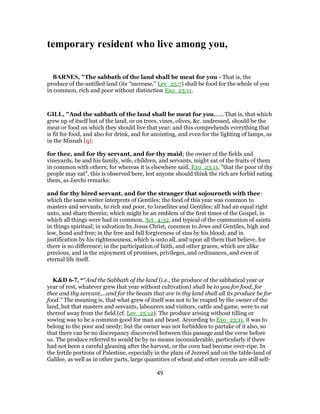
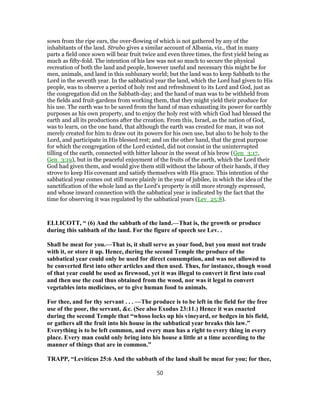
![and for thy servant, and for thy maid, and for thy hired servant, and for thy
stranger that sojourneth with thee,
Ver. 6. Shall be meat for you.] Thus God taught and inured them to depend upon
his providence, and to feed on faith, as some read that text. [Psalms 37:3] For
though the owner of the field might gather, even on that year, for the maintenance
of himself and family, yet he was neither to sow his field, thereby to increase his
harvest, nor to hedge his field, or lock up his vineyard, &c.
PETT, “Leviticus 25:6
“And the sabbath of the land shall be for food for you; for you, and for your servant
and for your maid, and for your hired servant and for your stranger, who sojourns
with you.”
So what grew on the land in that seventh year would be for everyone who went out
to collect it for themselves. There were to be no organised labour parties, no work
on the land organised by the owner. Anyone could go individually and collect what
he was able. It was to be an exercise in magnanimity. All could live off what the land
naturally produced under God. WHEDON, “Verse 6
6. The sabbath of the land — The spontaneous products of the soil during the
sabbatical year shall be meat, or common food, for all classes indiscriminately, lords
and servants, natives and foreigners, rich and poor, cattle and game. The
assignment of the produce of this year to the poor in Exodus 23:11, does not exclude
the landowner from equal participation also. The quantity of this self-sown harvest
is sometimes fiftyfold, according to Strabo, when the previous harvest was over ripe
and there was not careful gleaning. This may have been the designed character of
the sixth harvest.
Thy stranger — The thoshabh is one who lives permanently in the country, but
without the rights of a citizen; different from a ger, who may live there for a time.
7 as well as for your livestock and the wild
animals in your land. Whatever the land produces
may be eaten.
51](https://image.slidesharecdn.com/leviticus25commentary-161222180012/85/Leviticus-25-commentary-51-320.jpg)
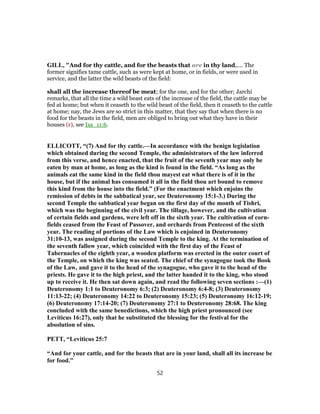
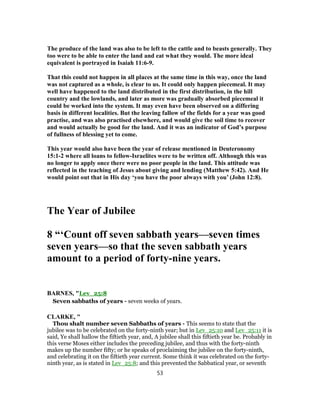
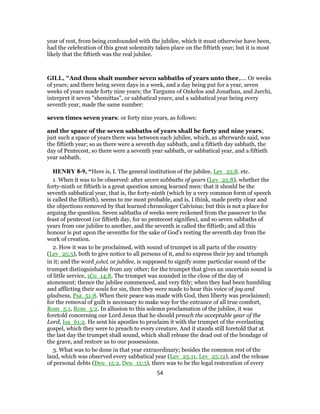
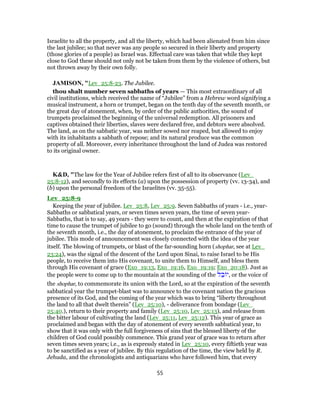
![seventh sabbatical year, i.e., the 49th year, was to be kept as the year of jubilee, is proved
to be at variance with the text, and the fiftieth year is shown to be the year of rest, in
which the sabbatical idea attained its fullest realization, and reached its earthly temporal
close.
CALVIN, "8.And thou shalt number seven. The third kind of Sabbath follows,
which was composed of forty-nine, or seven times seven years. This was the most
illustrious Sabbath, since the state of the people, both as to their persons and their
houses and property, was renewed; and although in this way God had regard to the
public good, gave relief to the poor, so that their liberty should not be destroyed,
and preserved also the order laid down by Himself; still there is no question but that
He thus added an additional stimulus to incite the Jews to honor the Sabbath. For it
was a kind of imposing memorial of the sacred rest, to see slaves emancipated and
become suddenly free; houses and lands returning to their former possessors who
had sold them; and in fine all things assuming a new face. They called this year
Jobel, from the sound of the ram’s horn, whereby liberty and the restitution of
property were proclaimed; but as I have said, its main feature was the solemnity
which shewed them to be separated from other nations to be a peculiar and holy
nation to God; nay, the renewal of all things had reference to this, that being
redeemed anew in the great Sabbath, they might entirely devote themselves to God
their Deliverer.
COFFMAN, “Verse 8
"And thou shalt number seven sabbaths of years unto thee, seven times seven years;
and there shall be unto thee the days of seven sabbaths of years, even forty and nine
years. Then shalt thou send abroad the loud trumpet on the tenth day of the seventh
month; in the day of atonement shall ye send abroad the trumpet throughout all
your land. And ye shall hallow the fiftieth year, and proclaim liberty throughout the
land unto all the inhabitants thereof: it shall be a jubilee unto you; and ye shall
return every man unto his possession, and ye shall return every man unto his family.
A jubilee shall that fiftieth year be unto you: ye shall not sow, neither reap that
which groweth of itself in it, nor gather the grapes in it of the undressed vines. For it
is a jubilee; it shall be holy unto you: ye shall eat the increase thereof out of the
field."
It is quite obvious that on the year of Jubilee, coming immediately following the
seventh sabbatical year, there would have been back to back sabbatical years, and
this has been such a problem to some that they have even attempted to make the
Jubilee correspond with the 49th year, but the text makes it certain that there were
in fact two sabbath years together. "The Jubilee occurred every fiftieth year, and
not as some suppose, in the forty-ninth."[10] See Leviticus 25:21, where God's
instructions mentioned particularly the "three years" increase promised on the year
before the two adjacent sabbath years.
"The loud trumpet ... on the day of atonement ..." (Leviticus 25:9). The word for
56](https://image.slidesharecdn.com/leviticus25commentary-161222180012/85/Leviticus-25-commentary-56-320.jpg)
!["Jubilee" testifies to the antiquity of Leviticus. "The title alone (Jubilee) is an
indication that it was an institution of great antiquity."[11]
"Proclaim liberty throughout the land unto all the inhabitants thereof ..." These
words are engraved upon the Liberty Bell situated in Independence Hall,
Philadelphia, but, in their original context, the words refer to slavery and not to
political subjection. Despite this, the words were a powerful motivation in the
Revolutionary War.
"Ye shall return every man to his possession ..." The meaning of this was that every
Israelite was to be returned to the ancestral lands which belonged to his forebearers.
God was the actual Owner of all the land, and any Israelite in possession of it was
merely a tenant at will. Whose will? God's will. The occupancy and crops produced
by the land in specified years could be sold, but title to the land was not
transferable. It always reverted on the Jubilee to their heirs and successors of those
persons to whom God had assigned it at the time when Joshua divided the land of
Canaan among the Twelve Tribes. People of all times and nations have praised this
arrangement, impractical as it most assuredly would be in our own times. The
Jubilee stressed God's absolute ownership of the land. It was God's right by
creation, and by right of maintenance. The Jubilee discouraged and prevented the
endless building of greater and greater estates and effectively prevented the
development of a culture in which wealthy owners of most of the land would be able
to oppress and defraud the poor. Although most scholars do not believe that Israel
ever actually observed the Jubilee, the preservation of land within families of the
original persons receiving it seems to have prevailed for a long time. The incidents
of Ruth (Ruth 4) and of Naboth (1 Kings 21) show that the law against alienation of
the land prevailed in those times, and the case of Naboth in particular shows the
hatred of that law by the Monarchy which succeeded in the ultimate nullification of
it. Isaiah decried those who "lay house to house, and field to field" (Isaiah 5:8).
These were the monopolists who were buying up all the land, contrary to the Word
of God.
"And ye shall return every man to his family ..." (Leviticus 25:9). This elaborates
the heralded clause, "Proclaim liberty ... to all the inhabitants ..." This meant liberty
from slavery. Slaves were to be emancipated in every sabbatical year, making six
years the maximum time that one could be a slave. The law of the sabbath year and
of the Jubilee "would not suffer it to be forgotten that the slave was a man,
protecting him in every way possible in those times."[12]
COKE, “Leviticus 25:8. &c. And thou shalt number seven sabbaths of years unto
thee— Or, Seven weeks of years unto thee. As the sabbatical year was to be every
seventh year, so the year of jubilee was to be every seventh sabbatical year; and
though of greater dignity, and honoured with some higher privileges, was, in other
respects, the same with the sabbatical year mentioned in the foregoing verses. This is
the rather to be noted, as some have conceived that the sabbatical year differed from
that of the jubilee. It was proclaimed by sound of trumpet through the whole
57](https://image.slidesharecdn.com/leviticus25commentary-161222180012/85/Leviticus-25-commentary-57-320.jpg)
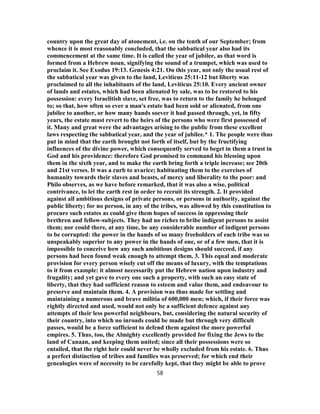
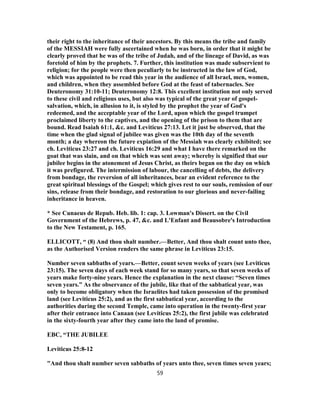
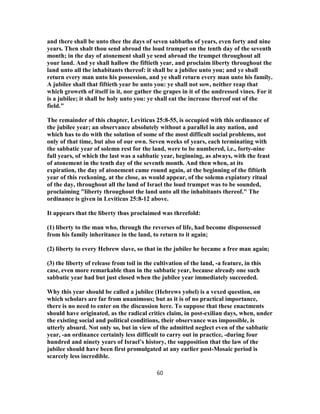
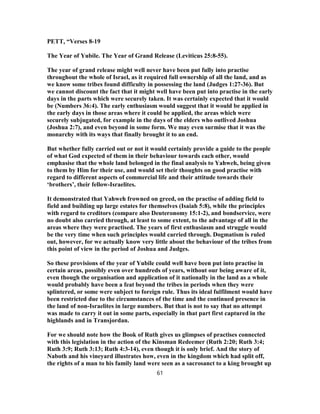
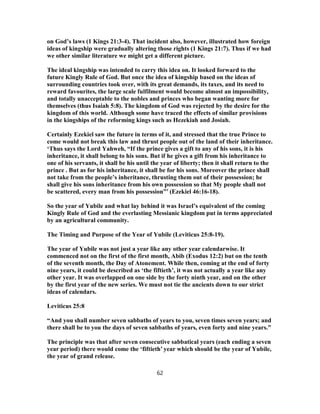
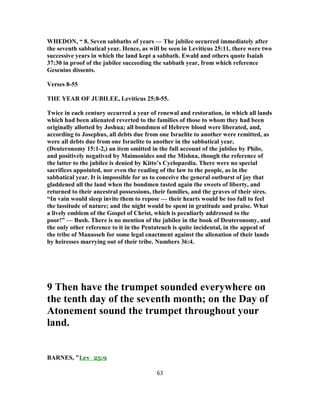
![Cause the trumpet of the jubile to sound - Rather, cause the sound of the cornet
to go through (the land). The word jubile does not occur in this verse in the Hebrew. The
trumpet is the shofar שׁפר shôphār, i. e. the cornet (rendered “shawm” in the Prayer-
Book version of Psa_98:7), either the horn of some animal or a tube of metal shaped like
one. As the sound of the cornet (see Lev_25:10 note) was the signal of the descent of
Yahweh when He came down upon Sinai to take Israel into covenant with Himself Exo_
19:13, Exo_19:16, Exo_19:19; Exo_20:18, so the same sound announced, at the close of
the great day of atonement, after the Evening sacrifice, the year which restored each
Israelite to the freedom and the blessings of the covenant.
GILL, "Then shall thou cause the trumpet of the jubilee to sound,.... At the
end of forty nine years, or at the beginning of the fiftieth; or "the trumpet of a loud
sound"; for here the word "jubilee" is not, which, according to some, was so called from
the peculiar sound of the trumpet on this day, different from all others; though others,
as Ben Melech, think, and the Jews commonly, that it had its name from the trumpet
itself, which they suppose was made of a ram's horn, "jobel", in the Arabic language,
signifying a ram; but the former reason is best; though perhaps it is best of all to derive
it from ,הוביל "to bring back, restore, return", because at this time men were returned to
their liberty, estates, and families, as hereafter expressed:
on the tenth day of the seventh month; the month Tisri or September, the first day
of which was the beginning of the year for "jubilees" (s); for the computation of the
jubilee year was made from the first day of the month, though the trumpet was not
blown, and the rights of the year did not begin till the tenth, as Maimonides (t) observes:
in the day of atonement shall ye make the trumpet sound throughout all
your land; which day of atonement was on the tenth day of the said month, and a very
proper time it was to sound the trumpet, that after they had been afflicting themselves,
then to have joy and comfort; and when atonement was made for all their sins, then to
hear the joyful sound; and when it might be presumed they were in a good disposition to
release their servants, and restore the poor to their possessions, when they themselves
were favoured with the forgiveness of all their sins. This sounding was made throughout
all the land of Israel; throughout all the highways, as Aben Ezra, that all might know the
year of jubilee was come; and this was done by the order of the sanhedrim, as
Maimonides (u) says, and who, also observes, that from the beginning of the year, to the
day of atonement, servants were not released to their own houses, but did not serve their
masters, nor were fields returned to their owners; but servants ate, and drank, and
rejoiced, and wore garlands on their heads; and when the day of atonement came, the
sanhedrim blew the trumpet, and the servants were dismissed to their houses, and fields
returned to their owners.
COKE, “Leviticus 25:9. On the tenth day of the seventh month— Calmet observes
from Maimonides, that "though the jubilee year began on the first day of the month
Tizri, or September, yet neither were the slaves restored to liberty, nor the lands
returned to their first owners, till the tenth day of that month. The nine first days
were spent in pleasure and festivity, [which, it is to be feared, became too soon,]
almost like that of the Romans in their saturnalia, [instead of the exercises of true
devotion.] During these nine days the slaves did not work for their masters, but ate
64](https://image.slidesharecdn.com/leviticus25commentary-161222180012/85/Leviticus-25-commentary-64-320.jpg)
![and drank, &c. and every one put a crown upon his head. No sooner was the day of
solemn expiation come, which is the tenth of Tizri, but the counsellors of the
Sanhedrim ordered the trumpets to sound; and at that instant the slaves were
declared free, and the lands returned to their old owners." Note; Though civil
liberty is precious, how much more to be prized is the liberty of the Gospel—a
liberty which leads to no excess, which gives us the victory over ourselves, and ends
in the eternal enjoyment of the Sovereign Good!
ELLICOTT, “ (9) Cause the trumpet of the jubile to sound.—Better, cause the blast
of the cornet to sound; literally, cause to resound the cornet of loud sound.
According to the authorities during the second Temple, the cornets used on this
occasion, like those of the Feast of Trumpets or New Year, were of rams’ horns, they
were straight, and had their mouth-piece covered with gold.
In the day of atonement shall ye make the trumpet sound.—Better, In the day of
atonement shall ye cause the cornet to sound. On the close of the great Day of
Atonement, when the Hebrews realised that they had peace of mind, that their
heavenly Father had annulled their sins, and that they had become reunited to Him
through His forgiving mercy, every Israelite was called upon to proclaim
throughout the land, by nine blasts of the cornet, that he too had given the soil rest,
that he had freed every encumbered family estate, and that he had given liberty to
every slave, who was now to rejoin his kindred. Inasmuch as God has forgiven his
debts, he also is to forgive his debtors.TRAPP, “Leviticus 25:9 Then shalt thou cause
the trumpet of the jubile to sound on the tenth [day] of the seventh month, in the
day of atonement shall ye make the trumpet sound throughout all your land.
Ver. 9. In the day of atonement.] Here began the jubilee: this feast was founded in a
fast. "They that sow in tears, shall reap in joy": neither is there any such comfort as
theirs that have soundly soaked themselves in godly sorrow. Pardon of sin is the
only foundation of all jubilees: and when God hath pardoned us, our hearts are in
fittest frame to pardon others.
PETT, “Leviticus 25:9
“Then shall you send abroad the loud ram’s horn on the tenth day of the seventh
month; in the day of atonement shall you send abroad the ram’s horn throughout all
your land.”
And on the Day of Atonement of that forty ninth year the rams’ horn (shophar)
should sound throughout the land and the year of grand release would begin. The
forty ninth year would already be a sabbatical year, and therefore a year of solemn
thought, thus the solemn Day of Atonement was a good day for commencing the
activities of the year of grand release. First Israel could rid itself of its burden of sin,
and then it could set about remedying the commercial and agricultural situation for
all ‘true-born’ Israelites. All would be restored to the visualised perfect beginning
once the land was subjugated and divided among all Israel.
65](https://image.slidesharecdn.com/leviticus25commentary-161222180012/85/Leviticus-25-commentary-65-320.jpg)
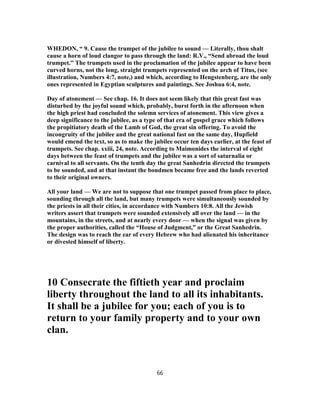
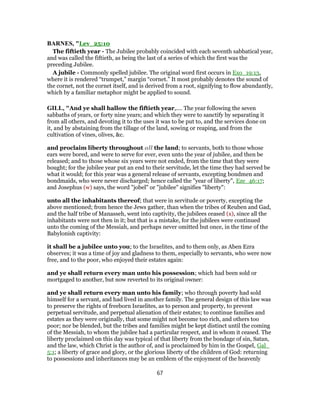
![inheritance by the saints; though man by sin lost an earthly paradise, and came short of
the glory of God, yet through Christ his people are restored to a better inheritance, an
incorruptible one; to which they are begotten by his Spirit, have a right to it through his
righteousness, and a meetness for it by his grace, and of which the Holy Spirit is the
earnest and pledge, and into which Christ himself will introduce them. And the
returning of them to their families may signify the return of God's elect through Christ to
the family that is named of him; these were secretly of the family of God from all
eternity, being taken into it in the covenant of grace, as well as predestinated to the
adoption of children: but by the fall, and through a state of nature by it, they became
children of wrath, even as others; yet through redemption by Christ, and faith in him,
they receive the adoption of children, and openly appear to be of the family of God, 2Co_
6:18; and all this is proclaimed by the sound of the Gospel trumpet, which being a sound
of liberty, peace, pardon, righteousness, salvation, and eternal life by Christ, is a joyful
one, Psa_89:15; where the allusion seems to be to the jubilee trumpet.
HENRY 10-13, “ The property which every man had in his dividend of the land of
Canaan could not be alienated any longer than till the year of jubilee, and then he or his
should return to it, and have a title to it as undisputed, and the possession of it as
undisturbed, as ever (Lev_25:10, Lev_25:13): “You shall return every man to his
possession; so that if a man had sold or mortgaged his estate, or any part of it, it should
then return to him or his heirs, free of all charge and encumbrance. Now this was no
wrong to the purchaser, because the year of jubilee was fixed, and every man knew when
it would come, and made his bargain accordingly. By our law indeed, if lands be granted
to a man and his heirs, upon condition that he should never sell or alienate them, the
grant is good, but the condition is void and repugnant: Iniquum est ingenuis hominibus
(say the lawyers) non esse liberam rerum suarum alienationem - It is unjust to prevent
free men from alienating their own possessions. Yet it is agreed in the books that if the
king grant lands to a man in fee upon condition he shall not alienate, the condition is
good. Now God would show his people Israel that their land was his, and they were his
tenants; and therefore he ties them up that they shall not have power to sell, but only to
make leases for any term of years, not going beyond the next jubilee. By this means it
was provided, [1.] That their genealogies should be carefully preserved, which would be
of use for clearing our Saviour's pedigree. [2.] That the distinction of tribes should be
kept up; for, though a man might purchase lands in another tribe, yet he could not retain
them longer than till the year of jubilee, and then they would revert of course. [3.] That
none should grow exorbitantly rich, by laying house to house, and field to field (Isa_5:8),
but should rather apply themselves to the cultivating of what they had than the enlarging
of their possessions. The wisdom of the Roman commonwealth sometimes provided that
no man should be master of above 500 acres. [4.] That no family should be sunk and
ruined, and condemned to perpetual poverty. This particular care God took for the
support of the honour of that people, and the preserving, not only of that good land to
the nation in general, but of every man's share to his family in particular, for a perpetual
inheritance, that it might the better typify that good part which shall never be taken
away from those that have it.
(2.) The liberty which every man was born to, if it were sold or forfeited, should
likewise return at the year of jubilee: You shall return every man to his family, Lev_
25:10. Those that were sold into other families thereby became strangers to their own;
but in this year of redemption they were to return. This was typical of our redemption by
68](https://image.slidesharecdn.com/leviticus25commentary-161222180012/85/Leviticus-25-commentary-68-320.jpg)
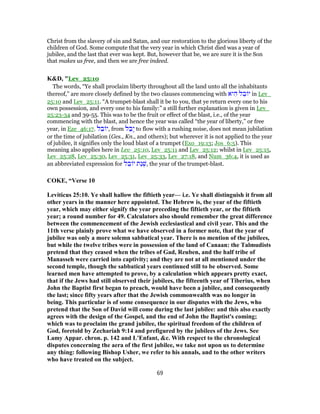
![Ye shall return every man unto his possession, and—unto his family— This law,
which may be called the Agrarian law of the Jews, was so famous, that the heathens
themselves took notice of it; insomuch, that Diodorus Siculus says, lib. 11: that it
was not lawful for the Jews to sell their own inheritances, i.e. to alienate them for
ever from their families. Jameson well observes, that as Moses revived several of the
ancient and primitive institutions of the patriarchs, so this appointment of restoring
all slaves to their liberty, after a certain term of years, seems to have been one.
Considering that all mankind are free by nature, it is highly probable that it was an
original institution in the first laws of nations, that no person should absolutely lose
his freedom. Many of the ancient heathen writers intimate, that there was such an
appointment in the days of Saturn; and in commemoration of this original state of
freedom, the Babylonians, Persians, Greeks, Romans, and others, celebrated
annually a sort of saturnalia, wherein all slaves for a time enjoyed their freedom.
ELLICOTT, “Verse 10
(10) And ye shall hallow the fiftieth year.—Because it is here said “Ye shall hallow
the fiftieth year,” the authorities during the second Temple inferred that the good
work of the jubile is to begin with the first day of Tishri, which is the beginning of
the year, and which ought to be hallowed. Hence as new year was with the Hebrews
the preparation for the Day of Atonement, so it also became the prelude to the acts
of mercy which finally came into operation on the Day of Atonement. They
therefore began counting the cycle of the jubile from the first of Tishri, or new year,
though they proclaimed it on the tenth, or on the close of the Day of Atonement. In
accordance with this the authorities during the second Temple record that “from
the Feast of Trumpets [i.e., Tishri 1] till the Day of Atonement [i.e., Tishri 10], the
slaves were neither manumitted to return to their homes, nor were made use of by
their masters, but ate, drank, rejoiced, and wore garlands; and when the Day of
Atonement came the judges blew the cornet, the slaves were manumitted to return
to their homes, and the fields were set free.”
And proclaim liberty . . . unto all the inhabitants—That is, to all the Israelites, who
are the true possessors of the land. Hence the ancient authorities conclude that the
law of jubile was only in force as long as the whole Jewish nation dwelt in the land,
but not after the tribes of Reuben and Gad, and half the tribe of Manasseh, were
carried into captivity by Pul and Tilgath-Pilneser kings of Assyria (1 Chronicles
5:26), because “all the inhabitants” of the land dwelt no longer in it. It is from this
declaration to proclaim liberty that the year of jubile is also called “the year of
freedom” (Ezekiel 46:17).
It shall be a jubile.—This is an abbreviation of the fuller form, “a year of jubile,”
used in the other passages of this chapter (see Leviticus 25:13; Leviticus 25:28;
Leviticus 25:40; Leviticus 25:50; Leviticus 25:52; Leviticus 25:54), and denotes “a
year proclaimed by the blast of the horn,” since the word yôbel signifies both ram’s
horn and the sound emitted from it.
70](https://image.slidesharecdn.com/leviticus25commentary-161222180012/85/Leviticus-25-commentary-70-320.jpg)
![And ye shall return every man.—See Leviticus 25:14-16; Leviticus 25:23-28.
Every man unto his family.—See Leviticus 25:39-40.
TRAPP, “Leviticus 25:10 And ye shall hallow the fiftieth year, and proclaim liberty
throughout [all] the land unto all the inhabitants thereof: it shall be a jubile unto
you; and ye shall return every man unto his possession, and ye shall return every
man unto his family.
Ver. 10. And proclaim liberty.] See this expounded by the prophet Isaiah. [Isaiah
61:1-2 Luke 4:21] A most joyful jubilee indeed. In the year of Christ, 1617, the Pope
proclaimed a jubilee for the peace of Italy and Austria. The Protestants also of
Germany did the like, in honour of God, and for joy of the Reformation begun by
Luther in Germany, a just (a) hundred of years before.
PETT, “Leviticus 25:10
“And you shall hallow the fiftieth year, and proclaim liberty throughout the land to
all its inhabitants. It shall be a yubile to you. And you shall return every man to his
possession, and you shall return every man to his family.”
It was to be a hallowed year, a year set apart to the glory of Yahweh, a year when
Israelite bondservants would gain their release, and all agricultural land and village
property would revert to its original owners.
WHEDON, “Verse 10
10. The fiftieth year was to be set apart for specific purposes, to be not only a year of
rest but of release and restoration. To obviate the difficulty of two successive years
of rest for the soil and idleness for the people, much ingenuity has been exhibited in
trying to prove that the fiftieth means the forty-ninth! We prefer to let a clear,
unequivocal statement, involving no inconsistency nor physical impossibility, stand
as written by Moses. Thus the jubilee was strictly a pentecostal year, holding the
same relation to the preceding seven sabbatical years as the pentecost day did to the
seven sabbath days; substantially the same formula is used in each case. See
Leviticus 23:15-16.
Proclaim liberty… unto all — Not to all Hebrews only, but “to all sitting in her,”
that is, in the land. The only exception may have been those sold for theft, but even
this class is not excepted in the law. See concluding note, (2.)
Jubilee — The term yobhel, primarily signifies a ram or ram’s horn, and
secondarily, a cry of joy, as if from the verb yabhel, to shout joyfully. Others derive
it from the causative form of the same verb, with the signification to make go, hence,
71](https://image.slidesharecdn.com/leviticus25commentary-161222180012/85/Leviticus-25-commentary-71-320.jpg)
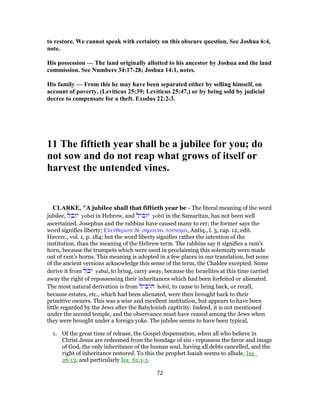
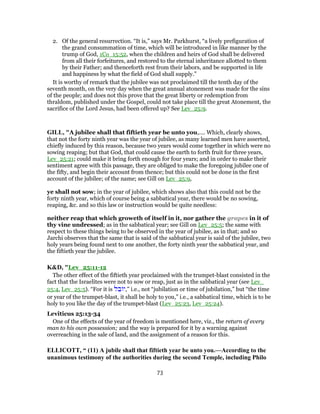
![(ii. 287-290) and Josephus (Antt. iii. 12, § 3), the jubile was observed every fiftieth
year, as is plainly enjoined both in the verse before us and in Leviticus 25:10. As the
forty-ninth year is the sabbatical year and the fiftieth year the jubile, there were two
successive fallow years.
Ye shall not sow.—As the fiftieth year is jubile, and partakes of the nature of the
sabbatical year, sowing and reaping are forbidden.
Neither reap that which groweth of itself in it.—That is, the spontaneous growth of
this year is not to be made into a regular harvest and stored up. (See Leviticus 25:5.)
Vine undressed.—See Leviticus 25:5.
TRAPP, “Leviticus 25:11 A jubile shall that fiftieth year be unto you: ye shall not
sow, neither reap that which groweth of itself in it, nor gather [the grapes] in it of
thy vine undressed.
Ver. 11. A jubilee shall that fiftieth year be.] Or, That jubilee shall be unto you the
year of fifty years. This first Mosaical jubilee was in 1396 BC.
PETT, “Leviticus 25:11
“A yubile shall that fiftieth year be to you: you shall not sow, nor reap that which
grows of itself in it, nor gather the grapes in it of the undressed vines.”
It was to be like the sabbatical years in that the land was to be left fallow, and in it
no sowing, reaping or organised gathering of grapes was to take place. Instead all
that was in the fields and the vineyards would be open for anyone who wanted it. all
could gather to their hearts content, for the produce that year was Yahweh’s.
WHEDON, “Verse 11
11. Ye shall not sow, neither reap — This prohibition makes the fiftieth year
sabbatic, like the forty-ninth: the land being untilled two successive years. The
sustenance of the people in this case is provided for by the threefold productiveness
of the last secular year. See Leviticus 25:21.
Nor gather the grapes — It is probable that this applied only to the fields, and not to
the gardens attached to the houses.
12 For it is a jubilee and is to be holy for you; eat
only what is taken directly from the fields.
74](https://image.slidesharecdn.com/leviticus25commentary-161222180012/85/Leviticus-25-commentary-74-320.jpg)
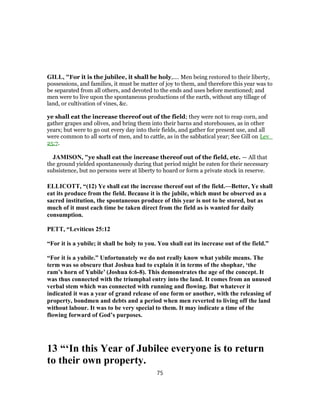
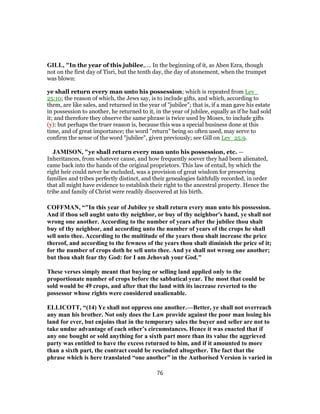
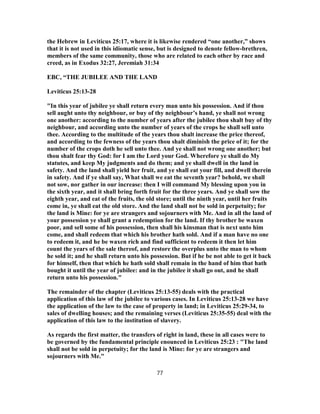
![Thus in the theocracy there was no such thing as either private or communal
ownership in land. Just as in some lands today the only owner of the land is the
king, so it was in Israel; but in this case the King was Jehovah. From this it follows
evidently, that properly speaking, according to this law, there could be no such
thing in Israel as a sale or purchase of land. All that any man could buy or sell was
the right to its products, and that, again, only for a limited time; for every fiftieth
year the land was to revert to the family to whom its use had been originally
assigned. Hence the regulations (Leviticus 25:14-19) regarding such transfers of the
right to the use of the land. They are all governed by the simple and equitable
principle that the price paid for the usufruct of the land was to be exactly
proportioned to the number of years which were to elapse between the date of the
sale and the reversion of the land, which would take place in the jubilee. Thus, the
price for such transfer of right in the first year of the jubilee period would be at its
maximum, because the sale covered the right to the produce of the land for forty-
nine years; while, on the other hand, in the case of a transfer made in the forty-
eighth year, the price would have fallen to a very small amount, as only the product
of one year’s cultivation remained to be sold, and after the ensuing sabbatic year the
land would revert in the jubilee to the original holder. The command to keep in
mind this principle, and not wrong one another, is enforced (Leviticus 25:17-19) by
the injunction to do this because of the fear of God; and by the promise that if Israel
will obey this law, they shall dwell in safety, and have abundance.
In Leviticus 25:24-28, after the declaration of the fundamental law that the land
belongs only to the Lord, and that they are to regard themselves as simply His
tenants, "sojourners with Him," a second application of the law is made. First, it is
ordered that in every case, and without reference to the year of jubilee, every
landholder who through stress of poverty may be obliged to sell the usufruct of his
land shall retain the right to redeem it. Three cases are assumed. First (Leviticus
25:25), it is ordered that if the poor man have lost his land, and have a kinsman who
is able to redeem it, he shall do so. Secondly (Leviticus 25:26), if he have no such
kinsman, but himself become able to redeem it, it shall be his privilege to do so. In
both cases alike, "the overplus," i.e., the value of the land for the years still
remaining till the jubilee, for which the purchaser had paid, is to be restored to him,
and then the land reverts at once, without waiting for the jubilee, to the original
proprietor. The third case (Leviticus 25:28) is that of the poor man who has no
kinsman to buy back his landholding, and never becomes able to do so himself. In
such a case, the purchaser was to hold it until the jubilee year, when the land
reverted without compensation to the family of the poor man who had transferred
it. That this was strictly equitable is self-evident, when we remember that, according
to the law previously laid down, the purchaser had only paid for the value of the
product of the land until the jubilee year; and when he had received its produce for
that time, naturally and in strict equity his right in the land terminated.
TRAPP, “Leviticus 25:14 And if thou sell ought unto thy neighbour, or buyest
[ought] of thy neighbour’s hand, ye shall not oppress one another:
78](https://image.slidesharecdn.com/leviticus25commentary-161222180012/85/Leviticus-25-commentary-78-320.jpg)
![Ver. 14. Ye shall not oppress.] But proceed by that golden rule, "Whatever ye would
that men should do to you, even so do ye to them."
PETT, “Leviticus 25:13
“In this year of yubile you shall return every man to his possession.”
Repeating the contents of verse 10 in true ancient fashion he repeats that in that
year of Yubile every man was to return to his possession, that is would again receive
the land originally given to him and his family once the conquest had taken place,
the principle behind this being that that family could never totally lose its
inheritance whatever went on during the fifty year period. A black sheep in the
family could not permanently lose the family its inheritance. In the end it would
always revert to them. This repetition then leads on to an expansion to explain the
idea more fully.
14 “‘If you sell land to any of your own people or
buy land from them, do not take advantage of
each other.
BARNES, "Sell ought - i. e., any piece of ground.
Oppress one another - Rather, overreach one another. (Compare 1Sa_12:3-4).
CLARKE, "Ye shall not oppress one another - Ye shall take no advantage of
each other’s ignorance either in buying or selling; for he that buys an article at less than
it is worth, or sells one for more than it is worth, taking advantage in both cases of the
ignorance of the vender or buyer, is no better than a thief, as he actually robs his
neighbor of as much property as he has bought the article at below or sold it above its
current value.
GILL, "And if thou sell ought unto thy neighbour,.... Any estate or possession,
house or land, at any time before the year of jubilee:
or buyest ought of thy neighbour's hand; of movable goods, as the Targum of
Jonathan interprets it; and so other Jewish writers (z) restrain this to goods which are
bought by hand, and delivered from hand to hand; and so they think that fields, and
79](https://image.slidesharecdn.com/leviticus25commentary-161222180012/85/Leviticus-25-commentary-79-320.jpg)
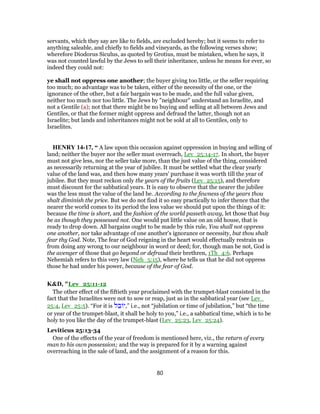
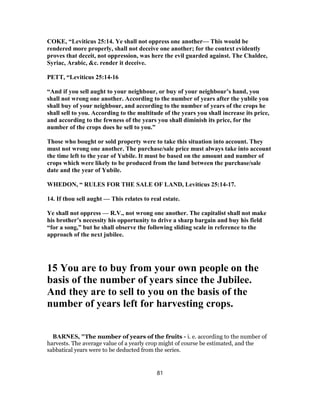
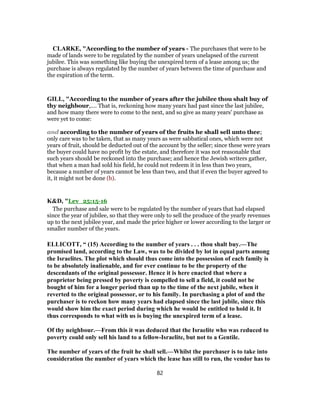
![consider how many sabbatical years there will be from the time of the sale till next
jubile, since the sale was not so much of the land as of the produce of so many years.
Hence the fallow sabbatical years are not to be included. As the plural “number of
years “is here used, the authorities during the second Temple concluded that the
vendor could not sell it for less than two productive years, exclusive of a sabbatical
year, a year of barrenness, and of the first harvest if the purchase was effected
shortly before the seventh month, with the ripe produce in the field.
TRAPP. “Leviticus 25:15 According to the number of years after the jubile thou
shalt buy of thy neighbour, [and] according unto the number of years of the fruits
he shall sell unto thee:
Ver. 15. Years of the fruits.] The land was not properly sold, but the fruits and
revenues thereof.
WHEDON, “ 15. The number of years of the fruits — The price of the usufruct of
the land, not of the fee simple, was calculated on the years of tillage, exclusive of the
years of rest, which would deprive the purchaser of a number of crops before the
jubilee. Josephus describes the terms on which the buyer resigned the field in the
year of jubilee to the original proprietor. The former produced a statement of the
value of the crops and of his expenses. If the expenses exceeded in value the income,
the balance was paid by the proprietor before the field was restored. But if the
balance was on the other side, the proprietor simply took back the field, and the
purchaser retained the profit. This arrangement would remove the objection to
permanent improvements on the part of the purchaser, while it kept estates from
deterioration.
16 When the years are many, you are to increase
the price, and when the years are few, you are to
decrease the price, because what is really being
sold to you is the number of crops.
GILL, "According to the multitude of years thou shalt increase the price
thereof,.... More was to be asked and required, and should be given for an estate, when,
for instance, there were thirty years to the year of jubilee, than when there were but
twenty:
83](https://image.slidesharecdn.com/leviticus25commentary-161222180012/85/Leviticus-25-commentary-83-320.jpg)
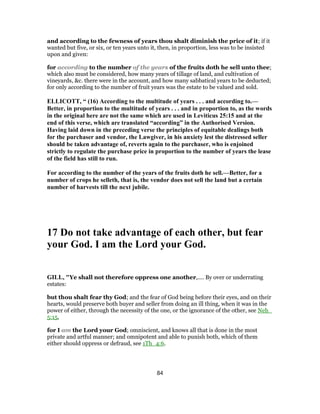
![JAMISON, "Ye shall not oppress one another, but thou shalt fear thy
God — This, which is the same as Lev_25:14, related to the sale or purchase of
possessions and the duty of paying an honest and equitable regard, on both sides, to the
limited period during which the bargain could stand. The object of the legislator was, as
far as possible, to maintain the original order of families, and an equality of condition
among the people.
K&D, "Lev_25:17-19
Overreaching and oppression God would avenge; they were therefore to fear before
Him. On the other hand, if they kept His commandments and judgments, He would take
care that they should dwell in the land in safety (secure, free from anxiety), and be
satisfied with the abundance of its produce. In this way Lev_25:18-22 fit on exceedingly
well to what precedes.
(Note: To prove that this verse is an interpolation made by the Jehovist into the
Elohistic writings, Knobel is obliged to resort to two groundless assumptions: viz.,
(1) to regard Lev_25:23 and Lev_25:24, which belong to what follows (Lev_25:25.)
and lay down the general rule respecting the possession and redemption of land, as
belonging to what precedes and connected with Lev_25:14-17; and (2) to explain
Lev_25:18-22 in the most arbitrary manner, as a supplementary clause relating to
the sabbatical year, whereas the promise that the sixth year should yield produce
enough for three years (Lev_25:21, Lev_25:22) shows as clearly as possible that they
treat of the year of jubilee together with the seventh sabbatical year which preceded
it, and in Lev_25:20 the seventh year is mentioned simply as the beginning of the
two years' Sabbath which the land was to keep without either sowing or reaping.)
ELLICOTT, “ (17) Ye shall not therefore oppress one another.—Better, And ye
shall not overreach any man his neighbour. (See Leviticus 25:14.)
But thou shalt fear thy God—who pleads the cause of the oppressed, and avenges
every injustice. (See Leviticus 19:14.
TRAPP, “Leviticus 25:17 Ye shall not therefore oppress one another; but thou shalt
fear thy God: for I [am] the LORD your God.
Ver. 17. But thou shalt fear thy God.] And so depart from this evil also. [Genesis
42:18] Joseph said to his brethren, who feared he would roll himself upon them,
"This do and live, for I fear God," q.d., I dare do you no hurt, though ye be fallen
into my danger. So his grandfather Isaac, seeing that he had done unwilling justice,
durst not reverse the blessing, though he had some mind to it, for God had
overawed him. [Genesis 27:33] And "ought ye not to have walked in the fear of the
Lord?" said good Nehemiah to those merciless griping usurers. [Nehemiah 5:10]
PETT, “Leviticus 25:17
“And you shall not wrong one another; but you shall fear your God: for I am
Yahweh your God.”
85](https://image.slidesharecdn.com/leviticus25commentary-161222180012/85/Leviticus-25-commentary-85-320.jpg)
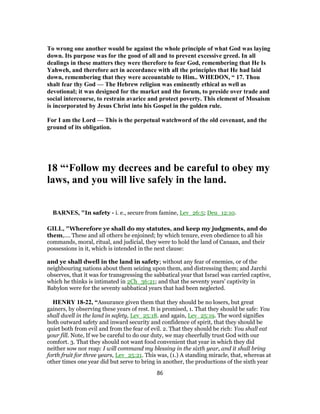
![should serve to bring in the ninth. Note, The blessing of God upon our provision will
make a little go a great way, and satisfy even the poor with bread, Psa_132:15. (2.) A
lasting memorial of the manna which was given double on the sixth day for two days.
(3.) It was intended for an encouragement to all God's people, in all ages, to trust him in
the way of duty, and to cast their care upon him. There is nothing lost by faith and self-
denial in our obedience.
COFFMAN, “"Wherefore ye shall do my statutes, and keep mine ordinances and do
them; and ye shall dwell in the land in safety. And the land shall yield its fruit, and
ye shall eat your fill, and dwell therein in safety. And if ye shall say, What shall we
eat the seventh year? behold, we shall not sow, nor gather in our increase; then I
will command my blessing upon you in the sixth year, and it shall bring forth fruit
for the three years. And ye shall sow the eighth year, and eat of the fruits, the old
store; until the ninth year, until its fruits come in, ye shall eat the old store."
Despite some ambiguity here, it is clear enough that with fruits for three years
specifically promised to be "commanded" by God for Israel, there would be
sufficient for back-to-back sabbath years. There appears to be a perpetual extension
of the principle inherent in the giving of the manna, wherein a double portion was
given on the sixth day to provide for the sabbath (the seventh day) when none could
be gathered.
"It shall bring forth produce for three years ..." (Leviticus 25:21). "What human
being himself could have promised such a thing? Only God could make such a
statement, and this makes it clear that none other but God Himself could have given
Israel the Law on Mount Sinai."[13] Such a deduction is profoundly true, and it is
likewise true in the instance of our Lord Jesus Christ's having promised his faithful
followers, "There is no man that hath left house, or brethren, or sisters, or mother,
or father, or children, or lands, for my sake and for the gospel's sake, but he shall
receive a hundredfold now in this time, houses, and brethren, and sisters, and
mothers and children, and lands, with persecutions, and in the world to come
eternal life! (Mark 10:29-30). Only God Incarnate could have said such a thing!
"Ye shall do my statutes ..." The great factor in this whole institution was that God
was the perpetual and sole Owner of the land (all of it), and that, just as the
Canaanites had forfeited their right to it by their persistent wickedness, Israel too
was never anything but "a tenant at will" (the will of God), so long as, but not any
longer than, they were obedient to God's will. The tragic fact is evident that Israel
never understood this at all, nor do those today who still imagine themselves to be
the "Sons of Abraham" and insist upon their divine right to Palestine! An even
greater tragedy is seen in the tacit acceptance of this falsehood by certain modern
nations, including our own, who are leagued in treaties with Israel guaranteeing to
that sinful nation an ownership to which they cannot possibly be legally entitled.
Our own feeling is that unfolding history will yet rebuke and destroy that error.
COKE, “Leviticus 25:18. Ye shall dwell in the land in safety— Hebrew, boldly,
87](https://image.slidesharecdn.com/leviticus25commentary-161222180012/85/Leviticus-25-commentary-87-320.jpg)
![without fear. For the original word בטח betach, says Dr. Beaumont, signifies both
the confidence or boldness which men, who trust in God, and walk in his ways, have
within themselves; and that safety and secure estate wherein God settleth them from
danger of evil.
ELLICOTT, “ (18) Wherefore ye shall do my statutes.—Better, And ye shall do . . .
that is, the above named statutes and ordinances respecting the sabbatical year and
the jubile, which required great sacrifices.
Ye shall dwell in the land in safety.—As God is Israel’s strong tower and wall of
defence, it is by keeping His commandments that the Israelites will enjoy the
security which other nations endeavour to obtain by great labour and mighty
armies.
And the land . . . her fruit.—He, moreover, who has given Israel these statutes, also
controls the operations of nature. Hence, though the observance of His laws would
necessitate the abstention from cultivating the soil, the Lord will cause the land to
yield an abundant harvest which will richly supply all their wants, and they will
safely and quietly dwell therein without being compelled to make raids upon their
neighbours for food, or surrender themselves to their enemies for want of provision
(1 Maccabees 6:49; 1 Maccabees 6:53; Josephus, Antt. xiv. 16, § 2; xv. :1, § 2).
TRAPP, “Leviticus 25:18 Wherefore ye shall do my statutes, and keep my
judgments, and do them; and ye shall dwell in the land in safety.
Ver. 18. Ye shall do my statutes.] Ye shall do them, and do them: that is, ye shall do
them diligently, {as Psalms 119:4} and then ye shall dwell in the land in safety; yea,
ye shall dwell there in safety: that is, ye shall assuredly; take my word for it.
PETT, “Leviticus 25:18-19
“Wherefore you shall do my statutes, and keep my ordinances and do them, and you
shall dwell in the land in safety. And the land shall yield its fruit, and you shall eat
your fill, and dwell in it in safety.”
For this was His promise. They were to do His statutes and keep His ordinances as
laid down through Moses, and He in His turn would ensure that the land yielded its
fruit, and that they could eat their fill. And it is doubly stressed that if they did these
things they would dwell in safety.
What does the year of Yubile mean to us? It is a concept. It reminds us that God’s
purposes go forward to a specific goal, a time when all will be restored and all God’s
people will receive the blessings that God has for them, when all will be put right.
Whatever the future holds we need not fear, for one day will come the glorious year
of Yubile, the year of restoration, the year of liberty. Daniel describes it in Daniel
9:24. It is a reminder of our glorious heavenly future, a future of permanence of
88](https://image.slidesharecdn.com/leviticus25commentary-161222180012/85/Leviticus-25-commentary-88-320.jpg)
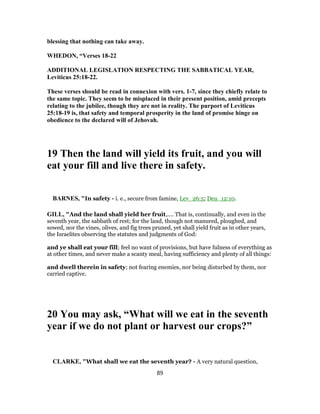
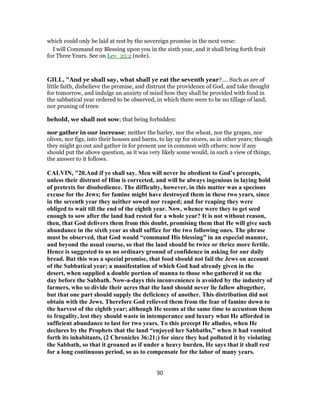
![COKE, “Leviticus 25:20, &c. And if ye shall say, &c.— This increase which the
Lord promises to give in the sixth year, was a continual proof to the Jews of his
regard to them, of his immediate government, and consequently of his particular
providence over them; another striking advantage of the present institution! The
supply of this sixth year was to be sufficient for three years, i.e. for the whole
seventh, the eighth when they sowed afresh, and for part of the ninth till they
reaped the fruits of the eighth year. This wise law respecting the sabbatical year,
and the year of jubilee, affords us a full proof of the divinity of the Mosaic
institution; for, had not the Jews been immediately under the divine protection and
providence, it would have been impossible for them to have observed this law.
Note; 1. They who follow God's will may safely trust him for a provision. 2. It would
be a shame to a Christian if he had less faith than a Jew, and if we should be more
afraid of wanting bread than they were. 3. With the blessing of God a little will go
far; so that, like the widow's cruse, we shall still have enough and to spare.
ELLICOTT, “ (20) What shall we eat the seventh year ?—The Lawgiver here
anticipates an objection on the part of those who are called upon to abstain from
cultivating the land in the sabbatical year, and who are overanxious about the
provisions of their families.
Behold, we shall not sow.—That is, are forbidden to sow. (See Leviticus 25:4.)
Nor gather in our increase.—That is, we are even prohibited to gather the
spontaneous growths and store them up, and are commanded to leave “the increase”
in the field. (See Leviticus 25:7.)
TRAPP, “Leviticus 25:20 And if ye shall say, What shall we eat the seventh year?
behold, we shall not sow, nor gather in our increase:
Ver. 20. And if ye shall say.] A clear answer to a carnal objection. Usually God
conceals the objection in Scripture, and meets it with an answer, which is an act of
grace.
PETT, “Verse 20-21
The Problem Of Having A Seventh Year Without Sowing and Planting (Leviticus
25:20-21).
Leviticus 25:20-21
“And if you shall say, What shall we eat the seventh year? Behold, we shall not sow,
nor gather in our increase, then I will command my blessing on you in the sixth
year, and it shall bring forth fruit for the three years.”
The first question we must raise here is as to the reference of ‘the seventh year’.
91](https://image.slidesharecdn.com/leviticus25commentary-161222180012/85/Leviticus-25-commentary-91-320.jpg)
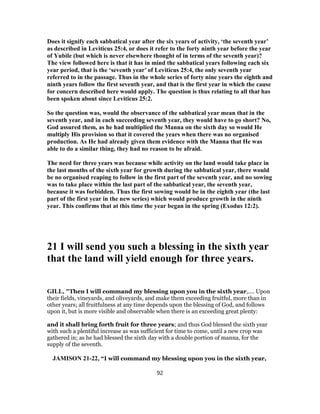
![and it shall bring forth fruit for three years, etc. — A provision was made, by the
special interposition of God, to supply the deficiency of food which would otherwise
have resulted from the suspension of all labor during the sabbatic year. The sixth year
was to yield a miraculous supply for three continuous years. And the remark is
applicable to the year of Jubilee as well as the sabbatic year. (See allusions to this
extraordinary provision in 2Ki_19:29; Isa_37:30). None but a legislator who was
conscious of acting under divine authority would have staked his character on so
singular an enactment as that of the sabbatic year; and none but a people who had
witnessed the fulfillment of the divine promise would have been induced to suspend
their agricultural preparations on a recurrence of a periodical Jubilee.
ELLICOTT, “ (21) Then I will command my blessing. That is, He will send out His
Divine command to the soil in the sixth year that it should be a blessing to them, and
it shall be done. (See Deuteronomy 28:8; Psalms 42:8; Psalms 44:4; Psalms 68:29.)
It shall bring forth fruit for three years.—Better, it shall bring forth produce. This
special blessing will be manifested in the abundant crop of the harvest preceding the
sabbatical year. Just as at the institution of the weekly Sabbath, when God enjoined
abstention from labour, He sent down a double portion of manna every sixth day to
make up for the day of rest (Exodus 16:22-27), so He will exercise a special
providence every sixth year by blessing the soil with a treble crop to compensate for
giving the land a septennial sabbath. As the sabbatical year began the civil year,
viz., 1 Tishri, which was in the autumn or in September, the three years here spoken
of are to be distributed as follows: (1) the remainder of the sixth year after the
harvest; (2) the whole of the seventh year; and (3) the period of the eighth year till
the harvest is gathered in from the seeds sown in the eighth year. It will thus be seen
that the question anticipated in Leviticus 25:29, viz., “What shall we eat the seventh
year?” properly applies to the eighth year, since the requirements for the seventh
year are supplied by the regular harvest of the sixth year, and it is the eighth year
for which the harvest of the seventh is wanted. To meet this difficulty, one of the
most distinguished Jewish expositors of the Middle Ages translates Leviticus 25:20 :
“And if ye shall say in the seventh year ‘What shall we eat’” i.e., in the eighth year.
It may, however, be that the question expresses the anxiety which the people might
feel in eating their ordinary share in the seventh year, lest there should be nothing
left for the eighth year, since in all other years the harvest is ripening for the next
year whilst the fruits of the past year are being consumed.
TRAPP, “Leviticus 25:21 Then I will command my blessing upon you in the sixth
year, and it shall bring forth fruit for three years.
Ver. 21. Command my blessing.] Now if God send his mandamus, who shall
gainstand it?
WHEDON, “21. Fruit for three years — The fact that three years are here provided
for instead of two, which the sabbath year required, is evidence that the jubilee
succeeds the seventh sabbath year and is not identical with it, as some suppose. No
93](https://image.slidesharecdn.com/leviticus25commentary-161222180012/85/Leviticus-25-commentary-93-320.jpg)
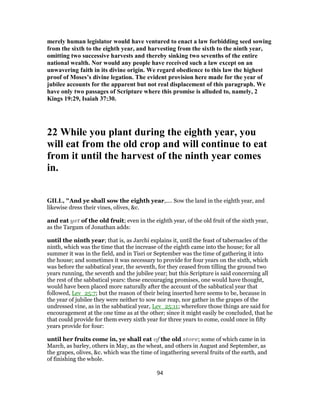
![K&D, "Lev_25:20-22
Jehovah would preserve them from want, without their sowing or reaping. He would
bestow His blessing upon them in the sixth year, so that it should bear the produce of
three (ת ָשָׂע for ה ָת ְשָׂע as in Gen_33:11); and when they sowed in the eighth year, they
should eat the produce of the old year up to the ninth year, that is to say, till the harvest
of that year. It is quite evident from Lev_25:21 and Lev_25:22, according to which the
sixth year was to produce enough for three years, and the sowing for the ninth was to
take place in the eighth, that not only the year of jubilee, but the sabbatical year also,
commenced in the autumn, when they first began to sow for the coming year; so that the
sowing was suspended from the autumn of the sixth year till the autumn of the seventh,
and even till the autumn of the eighth, whenever the jubilee year came round, in which
case both sowing and reaping were omitted for two years in succession, and
consequently the produce of the sixth year, which was harvested in the seventh month of
that year, must have sufficed for three years, not merely till the sowing in the autumn of
the eight or fiftieth year, but till the harvest of the ninth or fifty-first year, as the Talmud
and Rabbins of every age have understood the law.
ELLICOTT, “ (22) And ye shall sow the eighth year, and eat yet of old fruit.—
Better, And when ye shall sow in the eighth year, ye shall yet eat of the old produce,
that is, when at the termination of the sabbatical year the Israelites resume the
cultivation of the soil in the eighth year, the abundant crop of the sixth year—the
year preceding the sabbatical year—will not only suffice for this year, but will reach
till that part of the ninth year when the crops sown in the eighth are ripe and
gathered in. Accordingly, the sixth year’s harvest will suffice till the Feast of
Tabernacles, or till Tishri 1 of the ninth year.
Until her fruits come in.—Better, until its produce come in, that is, the produce of
the eighth year which was gathered in the ninth. Leviticus 25:20, therefore, which
states the anticipated question, and Leviticus 25:21-22, which contain the reply,
ought properly to follow immediately after Leviticus 25:7, since they meet the
difficulty arising from the rest of the land during the sabbatical year. The redactor
of Leviticus may, however, have inserted Leviticus 25:20-22 here because the
difficulty raised in them, and the reply given to the anticipated question, apply
equally to the jubile year. The special Divine interposition which is here promised to
meet the requirements of one year’s cessation from cultivating the land will, as a
matter of course, be all the more readily vouchsafed when the Israelites will have to
exercise greater obedience and faith in the jubile, and abstain two successive years
from tilling the ground.
TRAPP, “Leviticus 25:22 And ye shall sow the eighth year, and eat [yet] of old fruit
until the ninth year; until her fruits come in ye shall eat [of] the old [store].
Ver. 22. Ye shall eat of the old store.] Leave that care to me, who will cause you to
have "all sufficiency in all things, that ye may abound to every good work." [2
Corinthians 9:8; 2 Corinthians 9:10]
95](https://image.slidesharecdn.com/leviticus25commentary-161222180012/85/Leviticus-25-commentary-95-320.jpg)
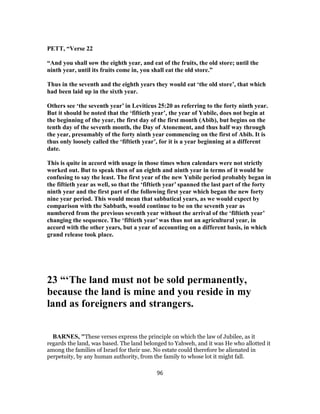
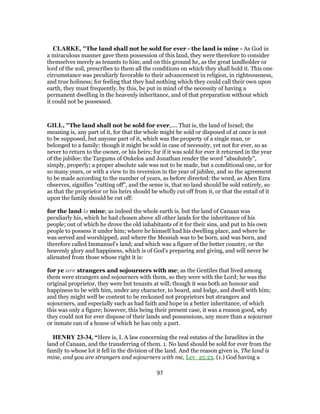
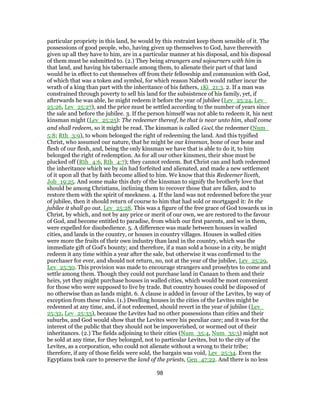
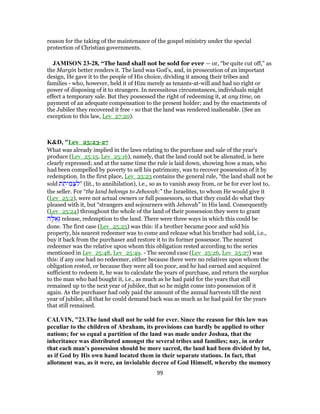
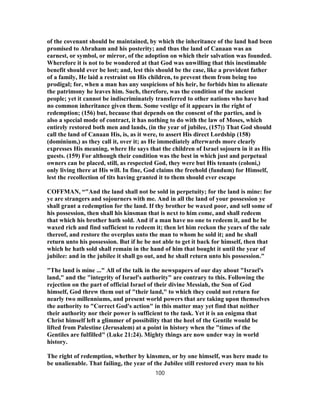
![possession. The spiritual overtones of this provision are of the most magnificent
dimensions. It is Christ, our near kinsman, who redeems us from sin and restores us
to our lost possession of innocence and communion with God. As a footnote in the
Polyglot Bible expressed it, "Through sin we had sold ourselves as bondmen to
Satan and to our lusts, but our near kinsman, who is Christ, redeemed us. Only He
could have done so."[14]
"Ye are strangers and sojourners with me ..." (Leviticus 25:23). This is the true
status of all men, whether or not they may be aware of it. One of Isaac Watts'
hymns has these lines:
Those dear delights we here enjoy
And fondly call our own
Are but short favors borrowed now
To be repaid anon.
"Sojourners ..." This word was rendered "pilgrims" in the N.T. (Hebrews 11:13; 1
Peter 2:11), a word which captures the precise meaning. It means literally, "one who
crosses the field," and it came into usage during the Crusades, when all across
Europe, it was nothing unusual for settled citizens to see a lonely traveler crossing a
clearing or a field on the way to the Holy Land. It came to have a very rich
connotation as referring to one who had no certain dwelling place, who had
forsaken all in pursuit of some worthy ideal. All life is ephemeral, transitory, short
and uncertain. "We are here today and gone tomorrow." All of those possessions
which would so readily possess ourselves - all of them shall be the possession of
others tomorrow. The land still belongs to God.
COKE, “Leviticus 25:23. The land shall not be sold for ever— That is, absolutely
and irredeemably: the reason of which is subjoined, because God considered himself
as the peculiar lord and proprietor of this land, and the people as his immediate
tenants and usufructuaries: which points out to us the striking peculiarity of the
Jewish state and polity; a theocracy, under which they lived not only as subjects, but
as tenants to God, their king and their lord.
ELLICOTT, “Verse 23
(23) The land shall not be sold for ever.—That is, no plot of the land of Israel must
be absolutely alienated from the original proprietor, who has been driven by
poverty to sell his patrimony. We have here a resumption of the laws relating to the
sale and purchase of land, which have already been briefly stated in Leviticus
25:14-17. Having been interrupted by the insertion of the Divine promise with
regard to the sabbatical year (Leviticus 25:20-22), the legislation now proceeds with
more directions about the limited sale of land.
101](https://image.slidesharecdn.com/leviticus25commentary-161222180012/85/Leviticus-25-commentary-101-320.jpg)
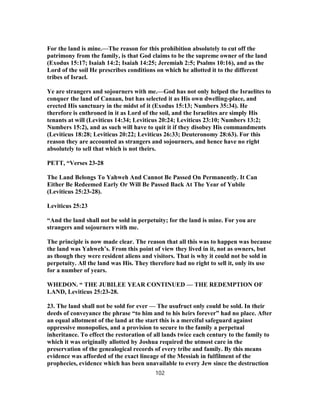
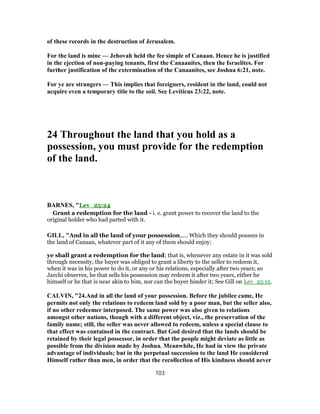
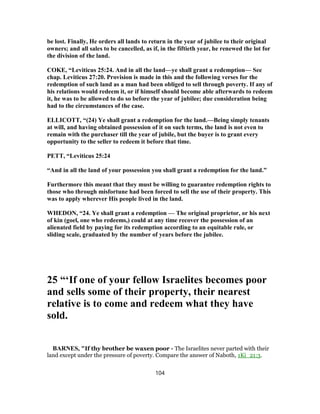
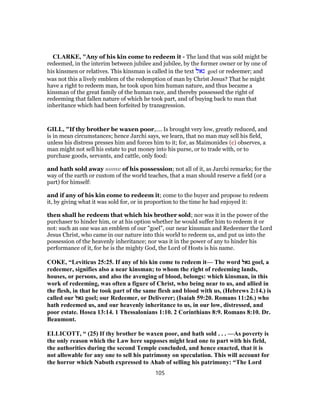
![forbid it me that I should give the inheritance of my fathers to thee” (1 Kings 21:3).
And if any of his kin come to redeem it, then shall he redeem.—Better, then his
nearest kinsman shall come and redeem. If he has thus been compelled by pressure
of poverty to sell part of his land, then it is the duty of the nearest relation, or, as the
original literally denotes, “the redeemer that is nearest to him,” to redeem the
property which his impoverished relative has been obliged to sell. The expression
“redeemer” is applied in Hebrew to one who, by virtue of being the nearest of kin,
had not only to redeem the patrimony of the family, but to marry the childless
widow of his brother (Ruth 3:13), and avenge the blood of his relative (Numbers
35:19-28; Deuteronomy 19:6-12).
TRAPP, “Leviticus 25:25 If thy brother be waxen poor, and hath sold away [some]
of his possession, and if any of his kin come to redeem it, then shall he redeem that
which his brother sold.
Ver. 25. And if any of his kin.] Christ is our near kinsman, and so by propinquity,
as man, had the right of redemption. [Ruth 2:20; Ruth 3:9; Ruth 3:11; Ruth 3:13]
PETT, “Leviticus 25:25
“If your brother has become poor, and sell some of his possession, then shall his
kinsman who is next to him come, and shall redeem that which his brother has
sold.”
Indeed when a man became poor and had to sell his land in order to survive, it was
incumbent on his nearest male relative to buy the land back as soon as possible, and
the purchaser could not refuse to sell. We call this man ‘the Kinsman Redeemer’.
We see this principle in action in the book of Ruth where Boaz acts as Kinsman
Redeemer on behalf of Naomi. There Naomi had not yet sold her land, but was
having to do so, and Boaz bought it as Kinsman Redeemer. But by putting himself
in the position of ‘nearest relative’ he also put himself in a position of having to raise
up children in the name of Ruth’s dead husband (Ruth 4:5; Ruth 4:10). While this
was not strictly required by the levirate Law which referred to ‘a brother’
(Deuteronomy 25:5-6), it had clearly become the interpretation of that Law,
‘brother’ being given its wider meaning. Thus those who would inherit the land as a
‘brother’ must inherit the wife and raise up seed to the dead man. However, as he
was not literally a brother, there was nothing unseemly in his marrying her as well,
and it would seem that he was required to do so. The woman and land went
together. To take on the land meant to take on the responsibility of the dead man’s
family.
The book also illustrates how men were already finding ways round the legislation,
i.e. the nearer kinsman who refused by pretending that he could not afford it (Ruth
4:6) when he had already said he would buy it (Ruth 4:4) simply because he did not
106](https://image.slidesharecdn.com/leviticus25commentary-161222180012/85/Leviticus-25-commentary-106-320.jpg)
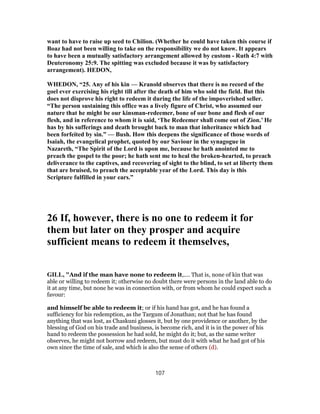
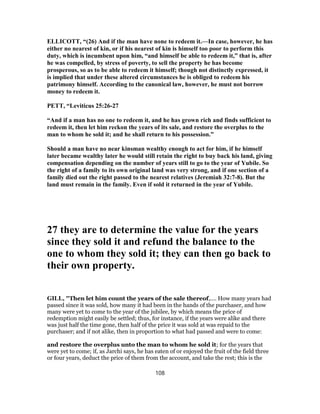
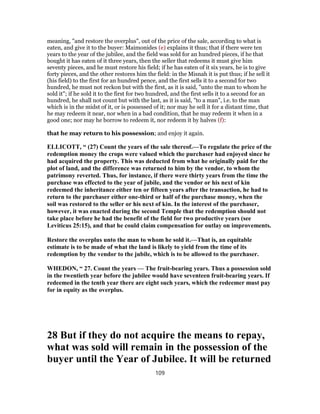
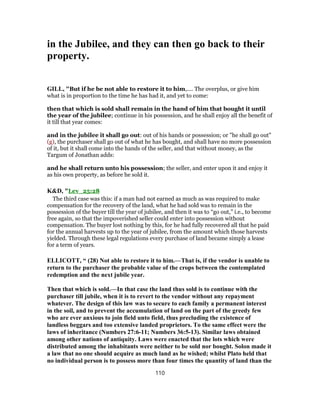
![lowest owner, who had only a single lot.
TRAPP, “Leviticus 25:28 But if he be not able to restore [it] to him, then that which
is sold shall remain in the hand of him that hath bought it until the year of jubile:
and in the jubile it shall go out, and he shall return unto his possession.
Ver. 28. And he shall return unto his possession.] So do all God’s Israel to their
heavenly inheritance. [Colossians 1:12-14 Ephesians 1:10-11; Ephesians 1:18 1 Peter
1:4]
PETT, “Leviticus 25:28
“But if he is not able to get it back for himself, then that which he has sold shall
remain in the hand of him that has bought it until the year of yubile: and in the
yubile it shall go out, and he shall return to his possession.”
Should he find himself in a position that he has no Kinsman Redeemer, and of not
himself gaining sufficient wealth, then he would have to wait until the year of
Yubile, but at the year of Yubile the land passed back to him anyway, and he could
take possession of it, the buyer meanwhile having retained the use of it up to this
date. Thus all were dealt with fairly.
The principle from all this for us is the concern that we should have that we share
our good things with others. Our aim should not be to grab as much as we can for
ourselves but to ensure that all share the good things of life, and that we do not
claim for ourselves more than a reasonable proportion.
29 “‘Anyone who sells a house in a walled city
retains the right of redemption a full year after its
sale. During that time the seller may redeem it.
CLARKE, "Sell a dwelling house in a walled city - A very proper difference is
put between houses in a city and houses in the country. If a man sold his house in the
city, he might redeem it any time in the course of a year; but if it were not redeemed
within that time, it could no more be redeemed, nor did it go out even in the jubilee. It
was not so with a house in the country; such a house might be redeemed during any part
of the interim; and if not redeemed, must go out at the jubilee. The reason in both cases
111](https://image.slidesharecdn.com/leviticus25commentary-161222180012/85/Leviticus-25-commentary-111-320.jpg)
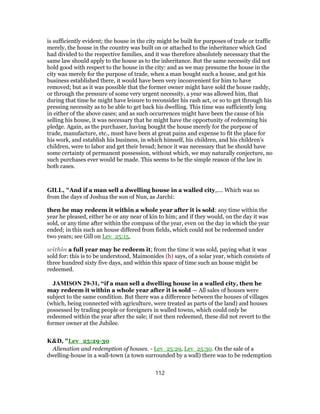
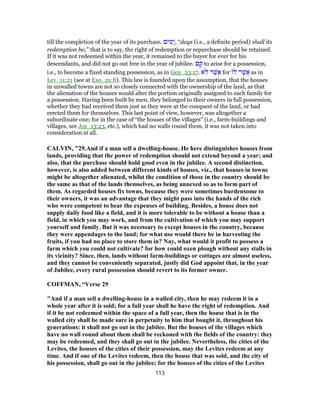
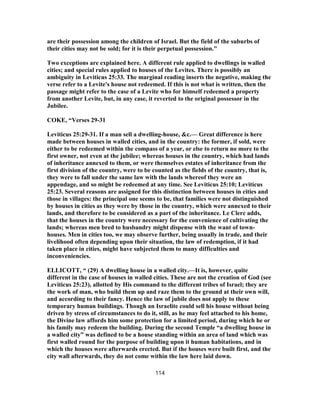
![Within a full year may he redeem it.—If within a year of the sale he wishes to
redeem, the Law gives him the power, or in case he dies empowers his son, to
repurchase the property at the same price which he received for it. Besides limiting
the period to a year, the Law does not prescribe that the next of kin is to redeem,
nor give him the power to do it. During the second Temple it was also enacted that
the vendor could not redeem it with borrowed money.
EBC, “THE JUBILEE AND DWELLING HOUSES
Leviticus 25:29-34
"And if a man sell a dwelling house in a wailed city, then he may redeem it within a
whole year after it is sold; for a full year shall he have the right of redemption. And
if it be not redeemed within the space of a full year, then the house that is in the
walled city shall be made sure in perpetuity to him that bought it, throughout his
generations: it shall not go out in the jubilee. But the houses of the villages which
have no wall round about them shall be reckoned with the fields of the country: they
may be redeemed, and they shall go out in the jubilee. Nevertheless the cities of the
Levites the houses of the cities of their possession, may the Levites redeem at any
time. And if one of the Levites redeem [not], then the house that was sold, and the
city of his possession, shall go out in the jubilee: for the houses of the cities of the
Levites are their possession among the children of Israel. But the field of the
suburbs of their cities may not be sold; for it is their perpetual possession."
In Leviticus 25:29-34 is considered the application of the jubilee ordinance to the
sale of dwelling houses: first (Leviticus 25:29-31), to such sale in case of the people
generally; secondly (Leviticus 25:32-34), to sales of houses by the Levites. Under the
former head we have first the law as regards sales of dwelling houses in "walled
cities"; to which it is ordered that the law of reversion in the jubilee shall not apply,
and for which the right of redemption was only to hold valid for one year. The
obvious reason for exempting houses in cities from the law of reversion is that the
law has to do only with land such as may be used in a pastoral or agricultural way
for man’s support. And this explains why, on the other hand, it is next ordered
(Leviticus 25:31) that in the case of houses in unwalled villages the law of
redemption and reversion in the jubilee shall apply as well as to the land. For the
inhabitants of the villages were the herdsmen and cultivators of the soil; and the
house was regarded rightly as a necessary attachment to the land, without which its
use would not be possible. But inasmuch as God had assigned no landholding to the
Levites in the original distribution of the land, -and apart from their houses they
had no possession (Leviticus 25:33), -in order to secure them in the privilege of a
permanent holding, such as others enjoyed in their lands, it was ordered that in
their case their houses, as being their only possession in real estate, should be
treated as were the landholdings of members of the other tribes.
The relation, of the jubilee law to personal rights in the land having been thus
determined and expounded, in the next place (Leviticus 25:35-55) is considered the
115](https://image.slidesharecdn.com/leviticus25commentary-161222180012/85/Leviticus-25-commentary-115-320.jpg)
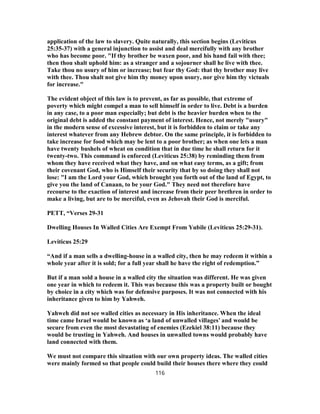
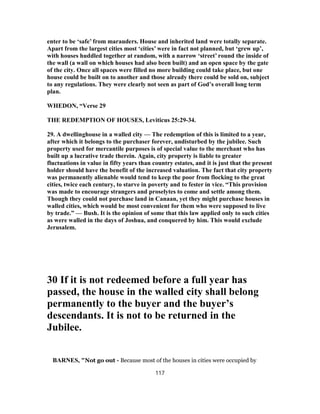
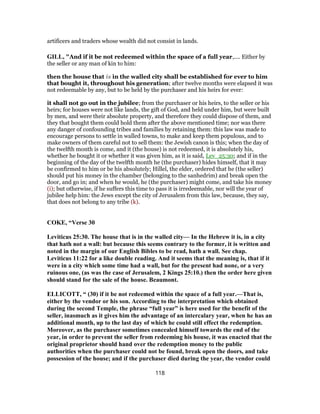
![redeem it from his heir.
It shall not go out in the jubile.—If the vendor, however, failed to redeem the house
within the prescribed period, it was not to be subject to the laws of jubile like the
land, but is to remain for ever the property of the purchaser.
TRAPP, “Leviticus 25:30 And if it be not redeemed within the space of a full year,
then the house that [is] in the walled city shall be established for ever to him that
bought it throughout his generations: it shall not go out in the jubile.
Ver. 30. And if it be not redeemed.] This would make the owners the better
husbands, and keep the houses in better repair.
PETT, “Leviticus 25:30
“And if it is not redeemed within the space of a completed year, then the house that
is in the walled city shall be made sure in perpetuity to him who bought it,
throughout his generations: it shall not go out in the yubile.”
If the house sold through necessity in the city was not redeemed within a full year
(presumably twelve moon periods, unless ‘completed year’ was intended to mean
365 days, a concept probably known at that time) then it belonged to the purchaser
in perpetuity.
31 But houses in villages without walls around
them are to be considered as belonging to the
open country. They can be redeemed, and they
are to be returned in the Jubilee.
GILL, "But the houses of the villages, which have no walls round about
them,.... As there were many in the days of Joshua, the Scripture speaks of: the Jews
suppose that such are meant, even though they were afterwards walled:
shall be counted as the fields of the country; and subject to the same law as they:
they may be redeemed; at any time before the year of jubilee, and if not, then
119](https://image.slidesharecdn.com/leviticus25commentary-161222180012/85/Leviticus-25-commentary-119-320.jpg)
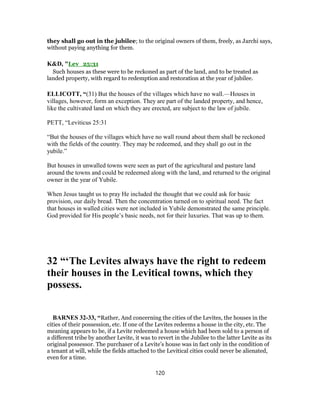
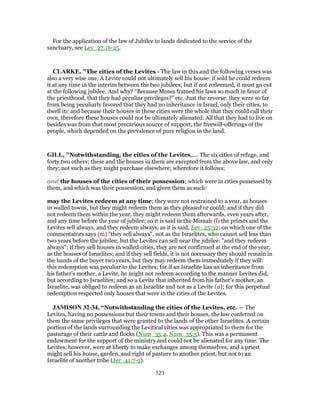
![K&D, "Lev_25:32
On the other hand, so far as the Levitical towns, viz., the houses of the Levites in the
towns belonging to them, were concerned, there was to be eternal redemption for the
Levites; that is to say, when they were parted with, the right of repurchase was never
lost. ם ָל ע (eternal) is to be understood as a contrast to the year allowed in the case of
other houses (Lev_25:29, Lev_25:30).
CALVIN, "32.Notwithstanding the cities of the Levites. Another exception, that the
Levites should recover the houses they had sold, either by the right of redemption,
or gratuitously in the year of jubilee. And this is not only appointed out of favor to
them, but because it concerned the whole people, that they should be posted like
sentries in the place which God had assigned to them. As to the suburbs, or the
lands destined for the support of their cattle, God forbids their alienation, because
thus they would have forsaken their proper station and removed elsewhere; whereas
it was of importance to the whole people that such a dispersion should not occur.
COKE, “Leviticus 25:32. Notwithstanding, the cities of the Levites, &c.— The
Levites' city-houses are exempted from the general law respecting houses in cities;
the reason for which is given in the 33rd verse, For the houses of the cities, &c. The
body of the Levites being a standing and perpetual body, they could not absolutely
alienate their houses or lands. See Numbers 18:21; Numbers 35:2. Deuteronomy
18:2.
Note; We are taught here, in the near kinsman and redeemer, to behold Jesus, flesh
of our flesh, and bone of our bone, who, when we had sold all, and were become
incapable of recovering our inheritance, paid down the purchase, and restored the
lost title.
ELLICOTT, “ (32) Notwithstanding the cities of the Levites, and the houses.—
Better, And as to the cities of the Levites, the houses, that is, the houses which
belong to the Levites, in the forty-eight cities given to them (see Numbers 35:1-8;
Joshua 21:1-3), are to be exempt from this general law of house property.
May the Levites redeem at any time.—Having the same value to the Levites as
landed property has to the other tribes, these houses are to be subject to the jubile
laws for fields, and hence may be redeemed at any time.
TRAPP, “Leviticus 25:32 Notwithstanding the cities of the Levites, [and] the houses
of the cities of their possession, may the Levites redeem at any time.
Ver. 32. May the Levites redeem at any time.] They were ever counted privileged
persons: and it was but reason. See Leviticus 25:33-34.
122](https://image.slidesharecdn.com/leviticus25commentary-161222180012/85/Leviticus-25-commentary-122-320.jpg)
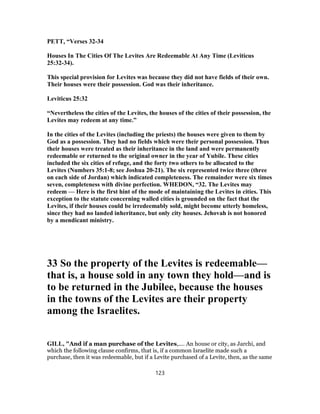
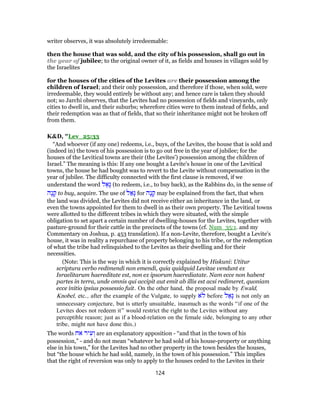
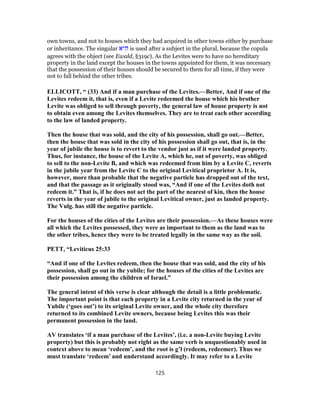
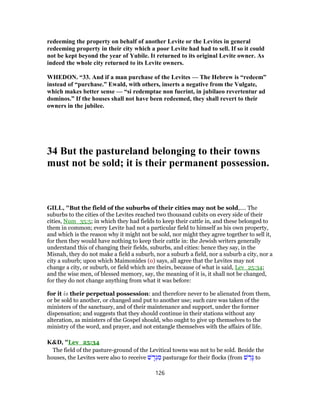
![drive, to drive out the cattle) round about these cities (Num_35:2-3). These meadows
were not to be saleable, and not even to be let till the year of jubilee; because, if they were
sold, the Levites would have nothing left upon which to feed their cattle.
ELLICOTT, “Verse 34
(34) But the field of the suburbs of their cities may not be sold.—The Levitical cities
had both suburbs or commons for their cattle, &c, and fields which they cultivated
(Numbers 35:4-5). These outlying fields, which were beyond the suburbs, they are
here forbidden to sell. According to the authorities during the second Temple the
expression “to sell” here used is to be taken in a wider sense as including diverting
any part of it from its original purpose. Hence they say it forbids the Levites not
only to sell the field, but to convert it into a suburb, and vice versâ. What is field
must always remain field, what is suburb must remain suburb, and what is city
must continue to be city.
For it is their perpetual possession.—The estates belong to the whole tribe to all
futurity, and the present occupiers have to transmit them intact to their successors.
Hence no present owner, or all of them combined, have a right to dispose of any
portion of the estates, or materially to alter it. They must hand these estates down to
their successors as they receive them from their predecessors.
TRAPP, “Leviticus 25:34 But the field of the suburbs of their cities may not be sold;
for it [is] their perpetual possession.
Ver. 34. May not be sold.] This law lasted but during the paedagogy: for Joses, a
Levite, sold his land, and brought the money, and laid it at the apostles’ feet. [Acts
4:36-37]
PETT, “Leviticus 25:34
“But the field of the suburbs of their cities may not be sold; for it is their perpetual
possession.”
However, Levite fields surrounding the city could not be sold. They belonged to the
Levites as a whole. They were their permanent possession.
Those who through dedication to God lose what is looked on as normal to men can
be sure that God will watch over their needs and especially provide for them. In the
words of Jesus, ‘Every one who has left houses, or brethren, or sisters, or father, or
mother, or children, or lands, for my name’s sake, shall receive a hundredfold, and
shall inherit eternal life’ (Matthew 19:29).
127](https://image.slidesharecdn.com/leviticus25commentary-161222180012/85/Leviticus-25-commentary-127-320.jpg)
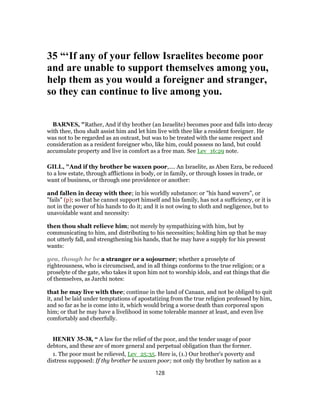
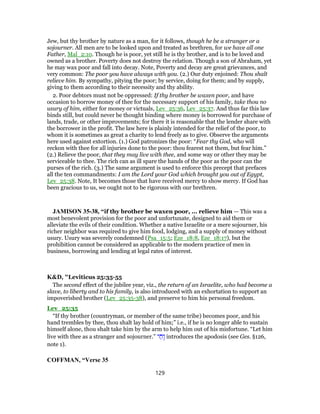
!["And if thy brother be waxed poor, and his hand fail with thee; then thou shalt
uphold him: as a stranger and a sojourner shall he live with thee. Take thou no
interest of him or increase, but fear thy God; that thy brother may live with thee.
Thou shalt not give him thy money upon interest, nor give him thy victuals for
increase. I am Jehovah your God, who brought you forth out of the land of Egypt, to
give you the land of Canaan, and to be your God."
This deals with special duties to a brother. In Leviticus 25:35, Orlinsky rendered
"means" instead of hand.[15] The word "brother" here carries the connotation of a
"brother Israelite," and is not restricted to brothers born of the same parentage.
The spirit of Christianity is one with that in view here. A brother in need, compelled
through want to borrow, should NOT be charged interest.
COKE, “Leviticus 25:35. And if thy brother be waxen poor— The two great
benefits of the year of jubilee were, a restoration to possessions and to freedom,
Leviticus 25:10. Such particulars as respect possessions being settled, the case of
freedom, or the release of servants and slaves, comes next to be considered: wherein
the benevolence of the divine Lawgiver is very observable, inculcating upon the
people the utmost compassion and charity towards their brethren in decay, to
proselytes and strangers, as well as to native Jews: for so the sacred writer himself
here explains the word brother.
ELLICOTT, “Verse 35
(35) And if thy brother be waxen poor.—This part of the jubile laws which relates to
the manumission of the Israelites who through poverty are compelled to sell
themselves as bondsmen (Leviticus 25:39-55) is introduced by a pathetic appeal to
the benevolence of the people to bestow brotherly help to the poor (Leviticus
25:35-38).
And fallen in decay with thee.—Literally, and his hand wavered with thee, that is,
when it is weak and can no longer render support, or gain a livelihood. As the laws
of jubile guard the future interests of the Israelite who is driven by stress of poverty
to sell his patrimony, the Lawgiver now points out the duties of each member of the
community to the impoverished brother who has to wait till the year of jubile for the
restoration of his property, but who in the meantime is unable to support himself.
Then thou shalt relieve him.—Literally, thou shalt lay hold of him. When his hand
is thus trembling, it is the duty of every Israelite to support his weak hand, and
enable it to gain a livelihood.
Though he be a stranger, or a sojourner.—Better, as a stranger and a sojourner,
that is, he is not to be treated like an outcast because he has been compelled by
poverty to sell his patrimony, but is to receive the same consideration which
strangers and sojourners receive, who, like the unfortunate Israelite, have no landed
130](https://image.slidesharecdn.com/leviticus25commentary-161222180012/85/Leviticus-25-commentary-130-320.jpg)
![property. (See Leviticus 19:33-34.)
TRAPP, “Leviticus 25:35 And if thy brother be waxen poor, and fallen in decay
with thee; then thou shalt relieve him: [yea, though he be] a stranger, or a
sojourner; that he may live with thee.
Ver. 35. That he may live with thee,] i.e., Live in good fashion; for a necessitous life
is a lifeless life. Thus shall ye say to him that liveth. [1 Samuel 25:6] So John 4:50,
"Thy son liveth."
PETT, “Verses 35-43
What The People of Israel’s Attitude Must Be Towards Their Brothers (Leviticus
25:35-43).
“Brothers” here means fellow-Israelites who got into financial difficulties, who were
to be treated with especial loving concern.
They Must Assist The Recovery Of Their Brother Who Falls On Hard Times
Without Seeking To Gain From Him (Leviticus 25:35-38).
Leviticus 25:35
“And if your brother has grown poor, and his hand fail with you, then you shall
uphold him. As a stranger and a sojourner shall he live with you.”
If a fellow-Israelite grew poor and failed financially among them for one reason or
another, he was to be ‘upheld’. He must be shown the same loving concern as a
resident alien or foreigner (compare Leviticus 19:34), whom the laws of hospitality
required should be welcomed (although not always carried out the principle was
firm). He must not be downgraded and made to feel a failure. He must be given
opportunities to work and to earn a living.
WHEDON, “Verse 35
MERCY TO THE POOR ENJOINED, Leviticus 25:35-43.
35. Thy brother — Of the seed of Abraham.
Thou shalt relieve him — The singular number here seems to signify an individual
obligation to relieve the poor, though systematic relief by the commonwealth is by
no means excluded.
That he may live — Bare existence is not here intended, but a happy life. This
explains the significance of the terms “life” and “eternal life.” The more abundant
life which Jesus Christ came to inspire in the believer, (John 10:10, note,) is fulness
131](https://image.slidesharecdn.com/leviticus25commentary-161222180012/85/Leviticus-25-commentary-131-320.jpg)

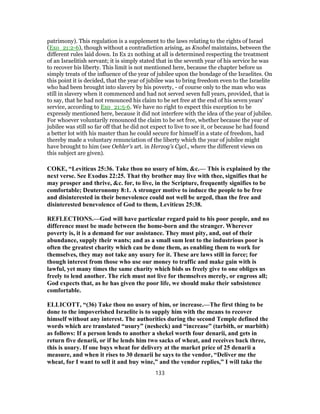
![wheat at 30 denarii and give thee wine for it,” though he has no wine, this is
increase. The “increase” lies in the fact that the vendor has no wine at the time, and
that he may possibly lose again by the rise in wine. Accordingly the former is a
charge upon money, whilst the latter is on products.
TRAPP, “Leviticus 25:36 Take thou no usury of him, or increase: but fear thy God;
that thy brother may live with thee.
Ver. 36. Take thou no usury.] God dispenseth with no usury, but condemns both
Neshec the biting, and Tarbith the toothless. In Rome at this day, all usurers are
excommunicated monthly. The Jews indeed are permitted to strain up their usury to
18 per cent upon the Christian, for among themselves they nowhere use it, which
causeth many of the unconscionable Christians to use these Jews underhandly in
improving their unlawful rents to the utmost proportion.
PETT, “Leviticus 25:36-37
“Take no interest of him or increase, but fear your God; that your brother may live
with you. You shall not give him your money on interest, nor give him your victuals
for increase.”
If money was lent to him, as it should be if he needed it (Deuteronomy 15:8), then
interest must not be charged. The loan must not be reduced in any way. And in fact
at the end of the seven years relief period described in Deuteronomy 15:1-2, the loan
was to be written off (Deuteronomy 15:2). If victuals were given to him no profit
must be made out of them. No additional charge must be made. They must fear their
God, the great Deliverer Who stooped to deliver them all from hardship in Egypt
when they were all failing financially, and give the fellow-Israelite every opportunity
for a recovery.
The fact that the seventh year of release resulted in loans being written off was not,
however, to prevent lending. They were to lend out of compassion. Compare here
Deuteronomy 7-11, ‘If there be with you a poor man, one of your brethren, within
any of your gates in your land which Yahweh your God gives you, you shall not
harden your heart, nor shut your hand from your poor brother; but you shall surely
open your hand to him, and shall surely lend him sufficient for his need of what he
wants. Beware that there be not a base thought in your heart, saying, ‘The seventh
year, the year of release, is at hand,’ and your eye be evil against your poor brother,
and you give him nothing; and he cry to Yahweh against you, and it be sin to you.
You shall surely give to him, and your heart shall not be grieved when you give to
him, because for this thing Yahweh your God will bless you in all your work, and in
all that you put your hand to. For the poor will never cease out of the land.
Therefore I command you, saying, You shall surely open your hand to your brother,
to your needy, and to your poor, in your land.’
Jesus put it this way, ‘Give to him who asks of you, and from him who would
134](https://image.slidesharecdn.com/leviticus25commentary-161222180012/85/Leviticus-25-commentary-134-320.jpg)
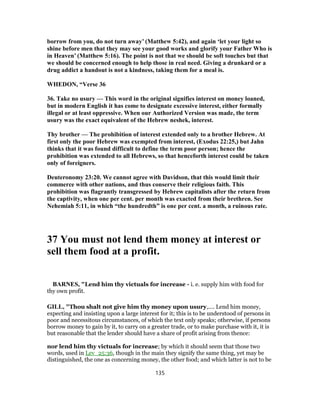
![given by way of loan to a person in want of it, but freely; as for instance, if a man gives a
poor man a bushel of wheat, on condition he gives him two for it hereafter, this is
lending or giving his victuals for increase.
38 I am the Lord your God, who brought you out
of Egypt to give you the land of Canaan and to be
your God.
BARNES, "Here, and in Lev_25:42, Lev_25:55, is expressed the principle which was
to limit and modify the servitude of Hebrew servants.
GILL, "I am the Lord your God, which brought you out of the land of
Egypt,.... Where they had been strangers and sojourners, and therefore should be kind
to such in necessitous circumstances, and relieve them, and especially their brethren;
and where God had given them favour in the eyes of the Egyptians, and they had lent
them jewels of gold and silver, and raiment, and therefore they should lend freely to
persons in distress; and who had brought them out from thence, that they might take
upon them his commandments, though they might be grievous, as Jarchi observes; and
this, it may be remarked, is the preface to the ten commandments:
to give you the land of Canaan; freely, a land flowing with milk and honey; and
therefore, since he had dealt so bountifully with them, and had given them plenty of
good things, they need not grudge giving to their poor brethren, and others in
necessitous circumstances:
and to be your God; their covenant God, to bless and prosper them, protect and
defend them.
TRAPP, “Leviticus 25:38 I [am] the LORD your God, which brought you forth out
of the land of Egypt, to give you the land of Canaan, [and] to be your God.
Ver. 38. I am the Lord your God.] Freely you have received, freely lend. You have
had me your benefactor, you shall have me your debtor.
PETT, “Leviticus 25:38
“I am Yahweh your God, who brought you forth out of the land of Egypt, to give
you the land of Canaan, and to be your God.”
136](https://image.slidesharecdn.com/leviticus25commentary-161222180012/85/Leviticus-25-commentary-136-320.jpg)
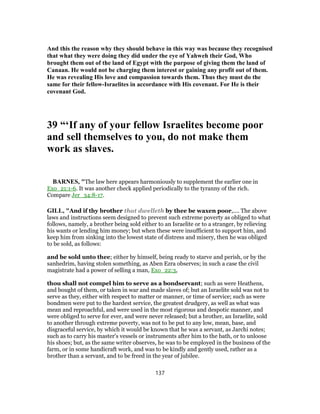
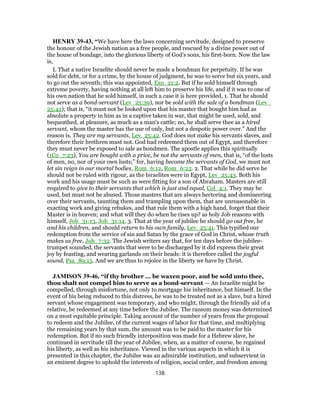
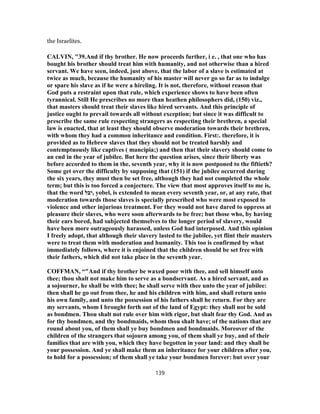
![brethren the children of Israel ye shall not rule, one over another, with rigor."
The great import of these verses is that "no Jew could be a bondslave." As
McClaren stated it:
"No Jew was to be a slave. To that broad principle, there were exceptions, as
when one voluntarily gave himself up to his creditors, but even he could not be
treated as a slave, but as a hired servant, and at Jubilee he went free."[16]
"The Jubilee law was a guarantee that no Jew would ever again be reduced to the
type of slavery that oppressed Israel in Egypt."[17] Non-Jewish persons could be
reduced to slavery, and the Jubilee did not apply to them. There is a distinction that
should be noted in "the nations that are round about you" (Leviticus 25:44), and
"strangers ... that sojourn among you ... that are with you" (Leviticus 25:45). The
reason for this lay in the fact that Israel was commanded to destroy the nations that
dwelt in Canaan, thus these would only have existed beyond the borders of Israel,
that is, if Israel had obeyed God's command in this matter.
ELLICOTT, “ (39) And if thy brother that dwelleth by thee be waxen poor.—
Better, And if thy brother be waxen poor by thee, that is, after supporting his
tottering hand, as prescribed in Leviticus 25:35-38, and making all the charitable
efforts to help him, they fail, and he still finds himself in extreme poverty, and
unable to obtain a livelihood.
And be sold unto thee.—The voluntary disposal of his own liberty for a money
consideration the Israelite could only effect by stress of poverty.
Thou shalt not compel him to serve as a bondservant.—Under these circumstances
he is not to be treated like heathen slaves who are either purchased or captured, and
made to do the menial service which these Gentile slaves have to perform. The
authorities during the second Temple adduce the following as degrading work
which the Israelite bondman is not to be put to: He must not attend his master at his
bath, nor tie up or undo the latchets of his sandals, &c., &c.
EBC, “THE JUBILEE AND SLAVERY
Leviticus 25:39-55
"And if thy brother be waxen poor with thee, and sell himself unto thee; thou shalt
not make him to serve as a bondservant: as a hired servant, and as a sojourner, he
shall be with thee; he shall serve with thee unto the year of jubilee: then shall he go
out from thee, he and his children with him, and shall return unto his own family,
and unto the possession of his fathers shall he return. For they are My servants,
which I brought forth out of the land of Egypt: they shall not be sold as bondmen.
Thou shalt not rule over him with rigour; but shalt fear thy God. And as for thy
bondmen, and thy bondmaids, which thou shalt have; of the nations that are
140](https://image.slidesharecdn.com/leviticus25commentary-161222180012/85/Leviticus-25-commentary-140-320.jpg)
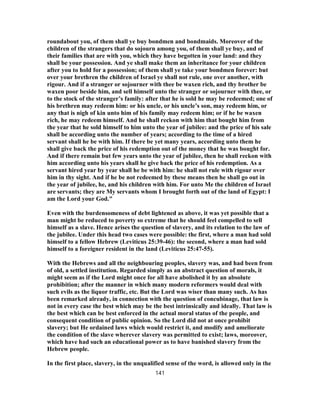
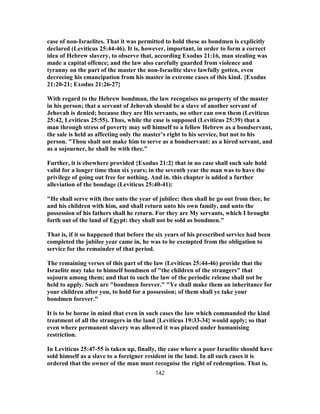
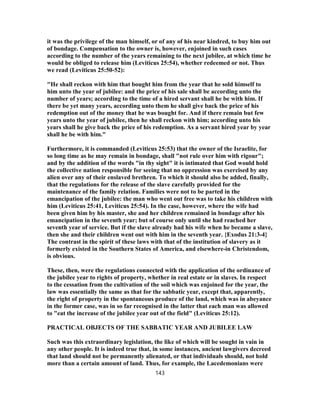
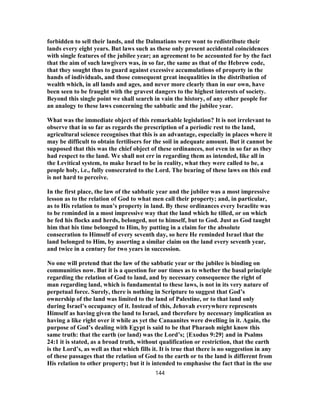
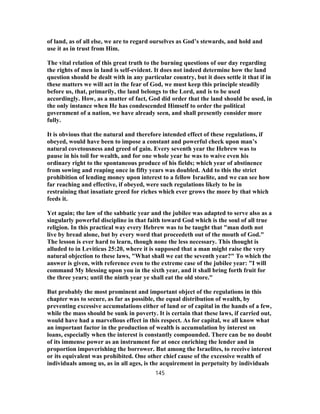
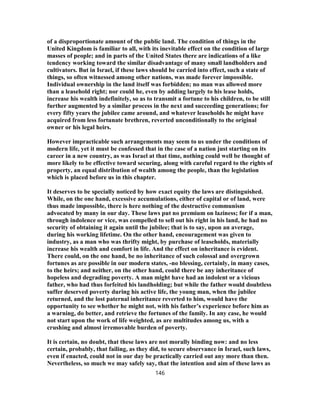
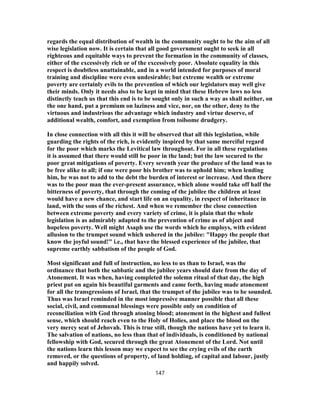
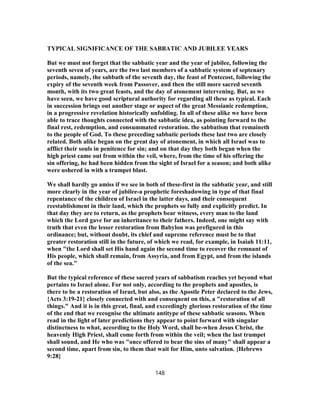
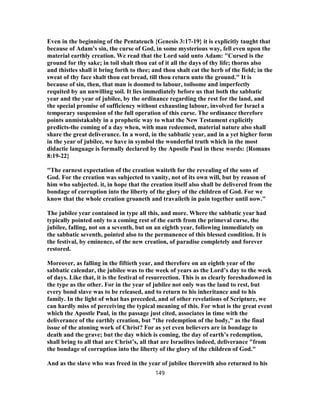
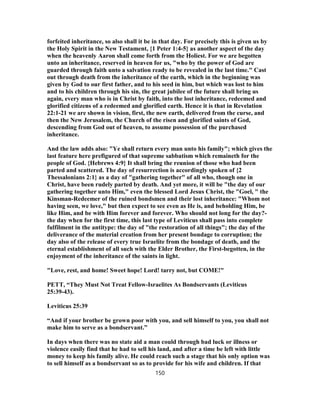
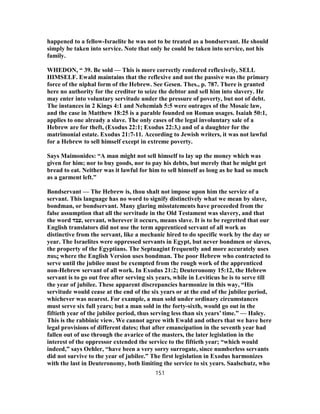
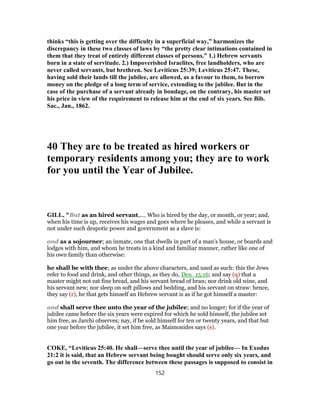
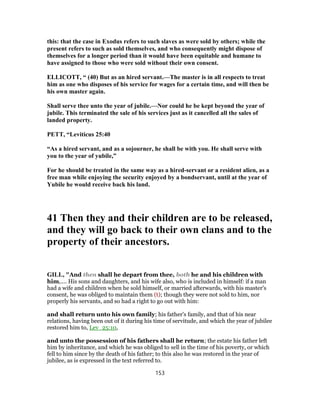
![TRAPP, “Leviticus 25:41 And [then] shall he depart from thee, [both] he and his
children with him, and shall return unto his own family, and unto the possession of
his fathers shall he return.
Ver. 41. And then shall he depart from thee.] Yea, and though he had been bored
through the ear, in token of perpetual servitude. [Exodus 21:2; Exodus 21:6]
PETT, “Leviticus 25:41
“Then shall he go out from you, he and his children with him, and shall return to his
own family, and to the possession of his fathers shall he return.”
Once the year of Yubile came he would be free to go back to his land, once more
totally free, together with his wife and children, (the wife as ever always assumed as
part of himself). They were not to be put in bondservice.
The same principle applies between Christians. We should treat fellow-Christians
well, whether we employ them, or are responsible for them, remembering that they
are our brothers and God’s men. But they too should not take advantage of the
situation. Responsibility lies on both sides.
WHEDON, “41. Unto the possession of his fathers — These words afford a key to
the difficulty which we have just discussed. The release here spoken of is that which
restores the servant to his landed inheritance. This in no way is in conflict with the
release of servants occurring every seventh year after their respective terms of six
years, a release unattended by the restoration of their ancestral lands.
42 Because the Israelites are my servants, whom I
brought out of Egypt, they must not be sold as
slaves.
CLARKE, "For they are my servants - As God redeemed every Israelite out of
Egyptian bondage, they were therefore to consider themselves as his property, and that
consequently they should not alienate themselves from him. It was in being his servants,
and devoted to his work, that both their religious and political service consisted. And
although their political liberty might be lost, they knew that their spiritual liberty never
could be forfeited except by an utter alienation from God. God therefore claims the same
154](https://image.slidesharecdn.com/leviticus25commentary-161222180012/85/Leviticus-25-commentary-154-320.jpg)
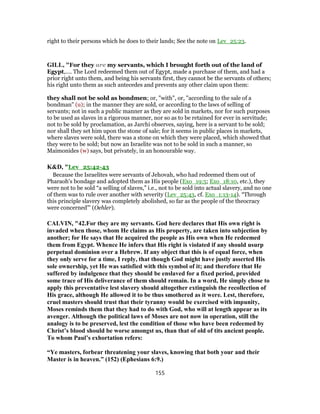
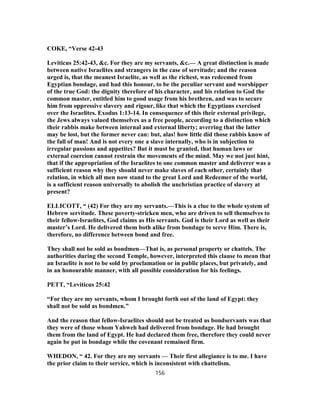
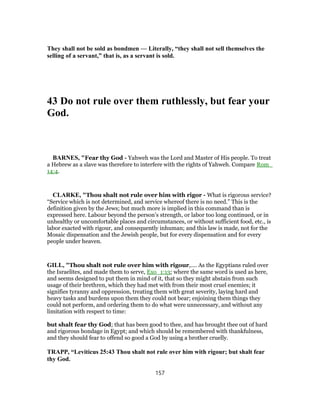
![Ver. 43. Rule over him with rigour.] As the Egyptians did over the Israelites.
[Exodus 1:13] Thy servant is made of the same earth with thee, and hath right to the
same heaven with thee. See Galatians 3:28. The servant paid the half shekel as well
as the master. Stand not therefore on terms of inequality, but know that yourselves
also have a Master in heaven. Do therefore to them "that which is right and equal."
[Colossians 4:1]
PETT, “Leviticus 25:43
“You shall not rule over him with rigor, but shall fear your God.”
Thus their Israelite masters were not to treat them roughly or severely as they had
all been treated in Egypt, but as fellow members of the covenant, because as masters
they feared God.HEDON, “Verse 43
43. Not rule… with rigour — Literally, thou shalt not tread on him. The rabbins
specified a variety of duties as coming under these general precepts; as
compensation for personal injury, exemption from such menial duties as unbinding
the master’s sandals or carrying him on a litter, while he was shielded from serious
abusive words. The master was also obliged to maintain the servant’s wife and
children, though, if they were free, he could exact no work from them. At the end of
his term of service the master was forbidden “to let him go away empty.”
Deuteronomy 15:13-14.
Fear thy God — Genuine piety always bears good will towards man as its first fruit.
Acts 16:33; Ephesians 6:9.
44 “‘Your male and female slaves are to come
from the nations around you; from them you may
buy slaves.
BARNES 44-46, “
Property in foreign slaves is here distinctly permitted. It was a patriarchal custom
Gen_17:12. Such slaves might be captives taken in war (Num_31:6 following; Deu_
158](https://image.slidesharecdn.com/leviticus25commentary-161222180012/85/Leviticus-25-commentary-158-320.jpg)
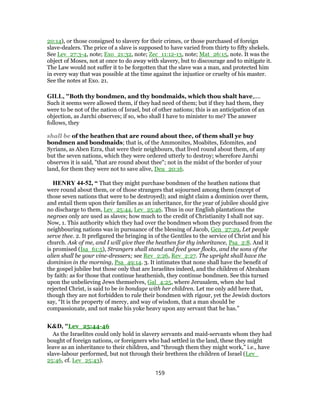
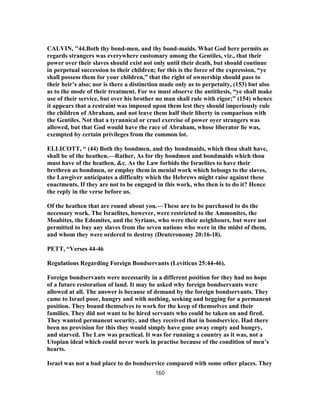
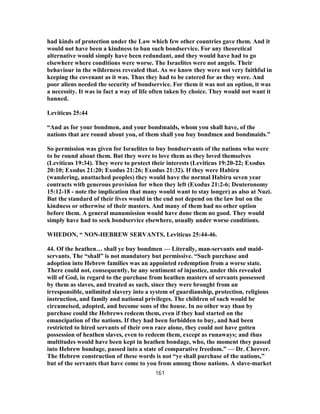
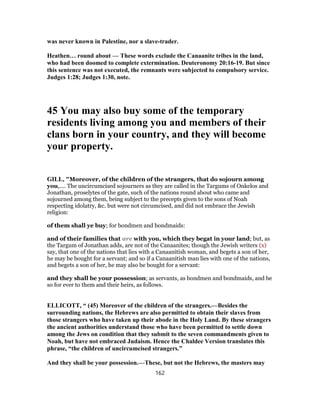
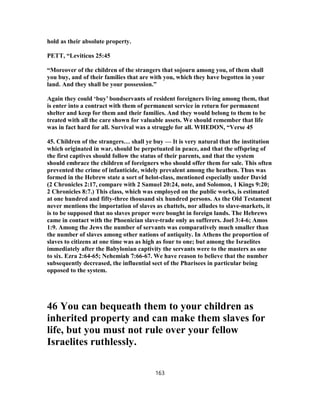
![GILL, "And ye shall take them as an inheritance for your children after
you,.... Which they might leave them at their death to inherit, as they did their estates
and lands; for such servants are, with the Jews (y), said to be like immovable goods, as
fields, vineyards:
to inherit them for a possession; as their property, as anything else that was
bequeathed to hem, as negroes now are in our plantations abroad:
thy shall be your bondmen for ever; and not be released at the year jubilee, nor
before nor after; unless they obtained their liberty, either by purchase, which they might
make themselves, or by the means of others, or else by a writing under their master's
hand dismissing them from his service (z); or in case they were maimed by him, then he
was obliged to let them go free, Exo_21:26,
but over your brethren, the children of Israel, ye shall not rule one over
another with rigour; which repeated for the confirmation of it, and for the fuller
explanation and description of the person not to be ruled over with rigour; and that it
might be the more taken notice of, and to make them the more careful in the observance
of it and though this peculiarly respects masters' treatment of their servants, yet Jarchi
thinks it comprehends a prince over his people, and a king over his ministers, whom he
may not rule with rigour.
ELLICOTT, “ (46) And ye shall take them as an inheritance for your children.—
That is, they may appropriate them to themselves, as their personal property, which
is transmissible as inheritance to posterity with the family land.
They shall be your bondmen for ever.—These are not subject to the laws of jubile.
They remain in perpetual serfdom unless they or their friends redeem them, or their
master has maimed any one of them. In case of injury the master is obliged to
manumit him (Exodus 21:26-27). The authorities during the second Temple enacted
that the master’s right, even with regard to this kind of bondmen, is restricted to
their labour, but that he has no right to barter with them, to misuse them, or to put
them to shame.
Over your brethren . . . ye shall not rule . . . with rigour.—In contrast to these
heathen bondmen the Jewish bondmen are here designated “brethren.” They are
co-religionists, who have been reduced to temporary servitude, but who are,
nevertheless, fellow-heirs with them in the land of their possession. Hence the
greatest consideration was to be shown to them in these adverse circumstances. The
authorities during the second Temple have therefore enacted that there must be no
difference between the daily food, raiment, and dwelling of the master and his
Hebrew slave, and that the master and the servant are alike in these respects.
TRAPP, “Leviticus 25:46 And ye shall take them as an inheritance for your children
after you, to inherit [them for] a possession; they shall be your bondmen for ever:
164](https://image.slidesharecdn.com/leviticus25commentary-161222180012/85/Leviticus-25-commentary-164-320.jpg)
![but over your brethren the children of Israel, ye shall not rule one over another with
rigour.
Ver. 46. But over your brethren the children of Israel.] Tacitus observed of the Jews
in his time, that to their own countrymen they were very kind: but toward all
others, cursed and cruel.
PETT, “Leviticus 25:46
“And you shall make them an inheritance for your children after you, to hold for a
possession; of them shall you take your bondmen for ever, but over your brethren
the children of Israel you shall not rule, one over another, with rigor.”
These bondmen and bondwomen became a permanent part of the ‘household’ and
would therefore continue on from father to son. They were there in perpetuity. They
had nowhere else to go. But this was never to be true of ‘Israelites’ within the
covenant. They were to be treated in a much more ‘brotherly fashion’, remembering
that at the year of Yubile they would return to their own land.
In the nature of what human beings are necessary distance had to be kept between a
master and his bondservants so that they would retain respect of him and not take
advantage of what they saw as ‘softness’. There are always some who will do so. The
path of a godly master is not always an easy one. But he must still have respect for
those beneath him.
(We must not read back into their way of life our ideas of slavery. We should
remember, for example, that in Egypt all men were slaves. Even the Grand Vizier.
They were slaves to Pharaoh. Only the priests were ‘free’, but they were bound by
their own rigid hierarchy. Everything Egyptians possessed they had from Pharaoh,
and owed to him, and he had the power of life and death over them. There was a
sense in which Israel were like that with Yahweh. They were slaves to Yahweh. So
they did not see the concept of ‘slavery’ as the cruel thing that we see it as. It was a
way of life for all, a matter of degrees. They would have understood no other. In the
end all men were slaves, slaves to their gods, slaves to the king, slaves to their tribe,
slaves to their family. There were levels of slavery but all were slaves. What
mattered was how it was handled. ‘Freedom’ was limited to the very few and was a
concept that would take thousands of years to grow into. They could not in fact have
coped with ‘freedom’. We can only enjoy freedom because of the framework that
has taken hundreds of years to put in place. The concepts in this chapter were a
genuine beginning to freedom).
WHEDON, “Verse 46
46. Take… as an inheritance — Rather, leave as an inheritance.
Bondmen forever — Albert Barnes thus explains this: “The permanent provision
165](https://image.slidesharecdn.com/leviticus25commentary-161222180012/85/Leviticus-25-commentary-165-320.jpg)
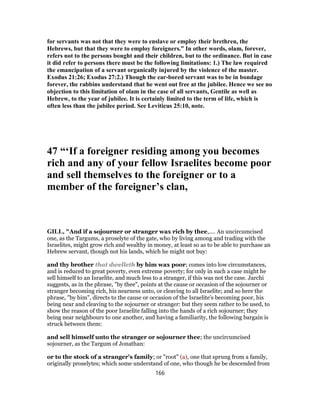
![such a family, was now rooted among the people of God, and incorporated into the
commonwealth of Israel; and yet such an one could not detain an Hebrew servant longer
than the year of jubilee: but the Jewish writers generally interpret it of an idolater (b).
K&D, "Lev_25:47-50
The servitude of an Israelite to a settler who had come to the possession of property,
or a non-Israelite dwelling in the land, was to be redeemable at any time. If an Israelite
had sold himself because of poverty to a foreign settler (בָשׁ תּ ֵרגּ, to distinguish the non-
Israelitish sojourner from the Israelitish, Lev_25:35), or to a stock of a foreigner, then
one of his brethren, or his uncle, or his uncle's son or some one of his kindred, was to
redeem him; or if he came into the possession of property, he was to redeem himself.
When this was done, the time was to be calculated from the year of purchase to the year
of jubilee, and “the money of his purchase was to be according to the number of the
years,” i.e., the price at which he had sold himself was to be distributed over the number
of years that he would have to serve to the year of jubilee; and “according to the days of a
day-labourer shall he be with him,” i.e., the time that he had worked was to be estimated
as that of a day-labourer, and be put to the credit of the man to be redeemed.
CALVIN, "47.And if a sojourner or a stranger. A caution is here introduced as to
the Israelites who had enslaved themselves to strangers. But by strangers
understand only those who inhabited the land of Canaan; for, if any one ]lad been
carried away into other countries, God would have enacted this law as to their
redemption in vain. A power, therefore, of redeeming the slave is granted to his
relatives, or, if he had himself obtained sufficient to pay his price, the same
permission is accorded to himself. The mode and the form of this are then
expressed: that a calculation of the time which remained before the jubilee should
be made, and the period which had already elapsed should be subtracted from the
sum, viz., if he had been sold for fifty shekels he should only pay ten shekels in the
fortieth year, because only a fifth part of the time remained. But if none of his
family aided him, and the unhappy man’s hope of redemption was frustrated, He
commands that he should be set free in the jubilee year, in which a general
enfranchisement took place as regarded the children of Abraham. The object of the
law was, that none of those whom God had adopted, should be alienated from their
race, and thus should depart from the true worship of God Himself. The whole of
this is comprehended in the last verse, where God declares that the children of
Abraham were His property, inasmuch as He had led them forth from the land of
Egypt, and, on the other hand, that He is their peculiar God. For, whilst it was just
that they should enjoy His blessing, so also it behooved that they should be kept
sound in His pure and undivided worship; whereas, if they had been the slaves of
Gentiles, not only would the elect people have been diminished in numbers, but
circumcision would have been corrupted and a door opened to impious perversions.
Yet God so mitigates His law as to lay no unjust burden upon sojourners, since He
concedes more to them, with respect to Hebrew slaves, than to the natives of the
land; for if they had sold themselves to their brethren, they went forth free in the
seventh year, whilst their slavery under sojourners was extended to the fiftieth year.
This exception only was introduced that the stranger who had bought slaves should
167](https://image.slidesharecdn.com/leviticus25commentary-161222180012/85/Leviticus-25-commentary-167-320.jpg)
![enfranchise them on the payment of their value. Since God had previously promised
to His people a large and manifold abundance of all good things, the poverty here
adverted to could only occur from the curse of God; (155) we see, therefore, that of
His incomparable loving-kindness He stretches forth His hand to the transgressors
of His law; and, whilst He chastises them with poverty, still looks upon them,
unworthy as they are, and provides a remedy for the ills which their own guilt had
brought upon them.
COFFMAN, “"And if a stranger or sojourner with thee be waxed rich, and thy
brother be waxed poor beside him, and sell himself unto the stranger or sojourner
with thee, or to the stock of the stranger's family; after that he is sold he may be
redeemed: one of his brethren may redeem him; or his uncle, or his uncle's son, may
redeem him, or any that is nigh of kin unto him of his family may redeem him; or if
he be waxed rich, he may redeem himself. And he shall reckon with him that bought
him from the year that he sold himself to him unto the year of jubilee: and the price
of his sale shall be according unto the number of years; according to the time of a
hired servant shall he be with him. If there be yet many years, according unto them
he shall give back the price of his redemption out of the money that he was bought
for. And if there remain but a few years unto the year of jubilee, then he shall
reckon with him; according unto his years shall he give back the price of his
redemption. As a servant hired year by year shall he be with him: he shall not rule
with rigor over him in thy sight. And if he be not redeemed by these means, then he
shall go out in the year of jubilee, he, and his children with him. For unto me the
children of Israel are servants; they are my servants whom I brought forth out of
the land of Egypt: I am Jehovah your God."
Wenham commented upon the theological reasons that lay behind the special rules
forbidding and for redeeming the slavery of Israelites as follows:
"God redeemed his people from Egyptian slavery, to become his servants. It is
unfitting, therefore, that an Israelite should be sold into slavery, especially to a
foreigner. The jubilee was a guarantee that no Israelites should continue in
slavery."[18]
Also, note the words "in thy sight" (Leviticus 25:53). This made every Israelite a de
facto monitor and policeman regarding any Israelite who was temporarily
indentured to a foreigner, with the implication that any abuse of the servant, or any
service "with rigor" that might be required, would result in the immediate
judgment of the offender.
The following basic principles are evident in the sacred instructions here concerning
the Jubilee:
OWNERSHIP OF LAND
It is contrary to the interests of society when the ownership of land is concentrated
168](https://image.slidesharecdn.com/leviticus25commentary-161222180012/85/Leviticus-25-commentary-168-320.jpg)
